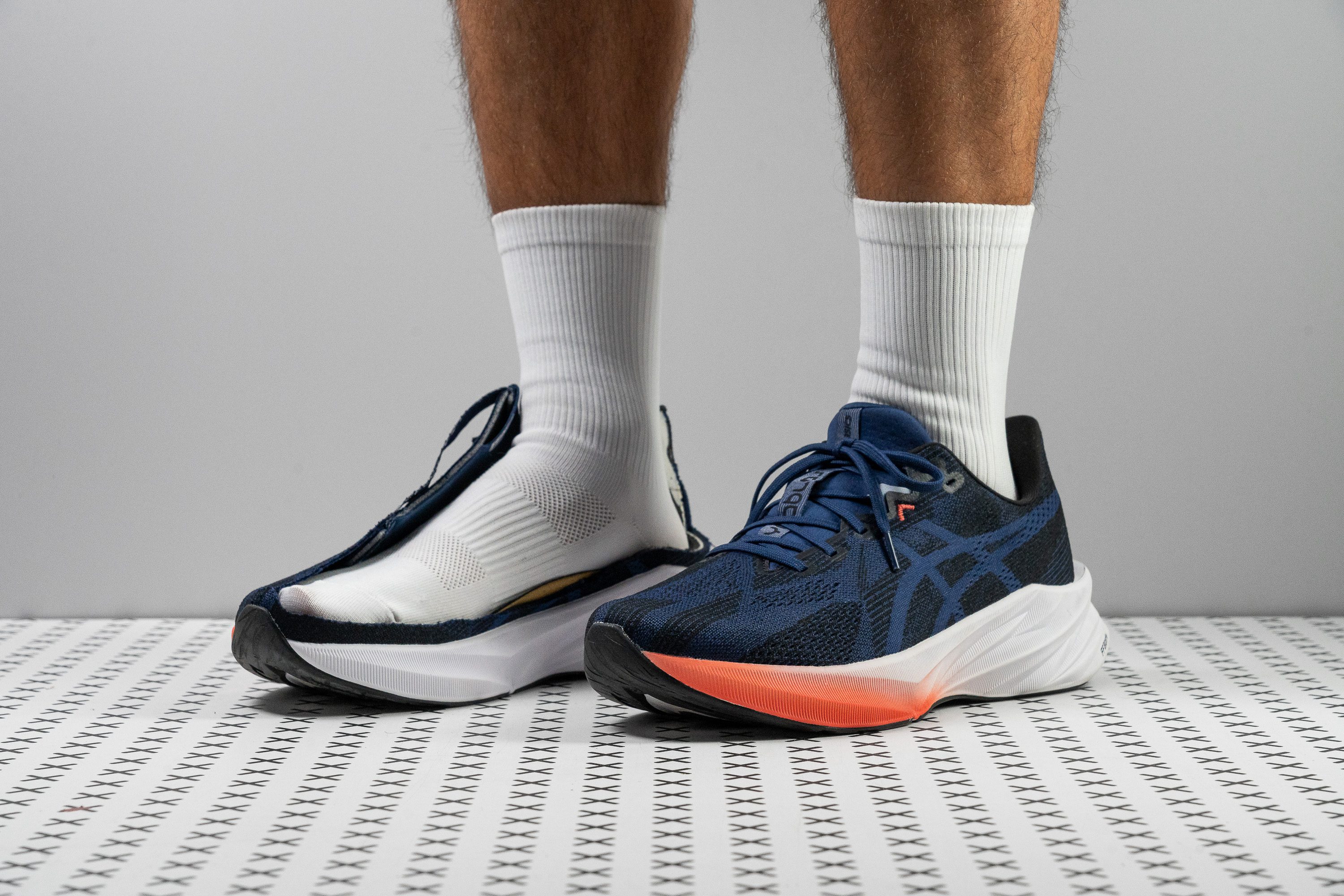Our verdict
- Top pick in best cushioned running shoes
- Top pick in best cheap running shoes
Pros
- World-Class shock absorption
- Maximalist cushioning at an affordable price
- Ideal for beginners
- High durability ratings
- Exceptional value
- Stable forefoot platform
- Drop suits all footstrikes
- Breathable upper
- Can handle long runs with ease
Cons
- Moderate-to-low energy return
- Heavier than Novablast 3
- Low volume toebox
Audience verdict
Comparison
The most similar running shoes compared
+ + Add a shoe | |||||
|---|---|---|---|---|---|
| Audience score | 83 Good! | 89 Great! | 85 Good! | 86 Good! | |
| Price | £115 | £140 | £140 | £140 | |
| Pace | Daily running | Daily running | Daily running | Daily running | |
| Shock absorption | High | High | High | High | |
| Energy return | Low | High | Low | Low | |
| Traction | High | High | High | High | |
| Arch support | Neutral | Neutral | Neutral | Neutral | |
| Weight lab Weight brand | 9.3 oz / 264g 9.2 oz / 260g | 10.2 oz / 288g 10.2 oz / 290g | 9.1 oz / 258g 9.3 oz / 265g | 10.7 oz / 303g 10.8 oz / 306g | |
| Drop lab Drop brand | 7.6 mm 8.0 mm | 7.0 mm 8.0 mm | 8.3 mm 10.0 mm | 7.3 mm 6.0 mm | |
| Strike pattern | Mid/forefoot | Mid/forefoot | HeelMid/forefoot | Mid/forefoot | |
| Size | True to size | Half size small | - | True to size | |
| Midsole softness | Balanced | Soft | Soft | Soft | |
| Difference in midsole softness in cold | Normal | Small | Normal | Normal | |
| Toebox durability | Good | Decent | Decent | Decent | |
| Heel padding durability | Good | Good | Good | Good | |
| Outsole durability | Good | Good | Decent | Good | |
| Breathability | Moderate | Moderate | Moderate | Moderate | |
| Width / fit | Medium | Medium | Medium | Medium | |
| Toebox width | Medium | Medium | Wide | Medium | |
| Stiffness | Moderate | Stiff | Moderate | Stiff | |
| Torsional rigidity | Stiff | Stiff | Stiff | Stiff | |
| Heel counter stiffness | Stiff | Moderate | Stiff | Stiff | |
| Heel lab Heel brand | 39.4 mm 39.0 mm | 40.1 mm 36.0 mm | 37.5 mm 39.0 mm | 38.5 mm 39.0 mm | |
| Forefoot lab Forefoot brand | 31.8 mm 31.0 mm | 33.1 mm 28.0 mm | 29.2 mm 29.0 mm | 31.2 mm 33.0 mm | |
| Widths available | Normal | Normal | NormalWide | NormalWideX-Wide | |
| Orthotic friendly | ✓ | ✓ | ✓ | ✓ | |
| Season | All seasons | All seasons | All seasons | All seasons | |
| Removable insole | ✓ | ✓ | ✓ | ✓ | |
| Ranking | #273 Bottom 28% | #84 Top 22% | #234 Bottom 38% | #198 Bottom 48% | |
| Popularity | #203 Bottom 46% | #246 Bottom 35% | #133 Top 35% | #20 Top 6% |
Who should buy
We tested the Dynablast 5 in the lab and found that it’s:
- Perfect for fans of the Novablast line who disliked versions 4 and 5 for its exaggerated midsole width.
- Ideal for runners seeking a daily trainer with solid durability at a very reasonable cost.
- A strong choice for forefoot or midfoot strikers wanting a single shoe for 2–3 runs a week without overspending.
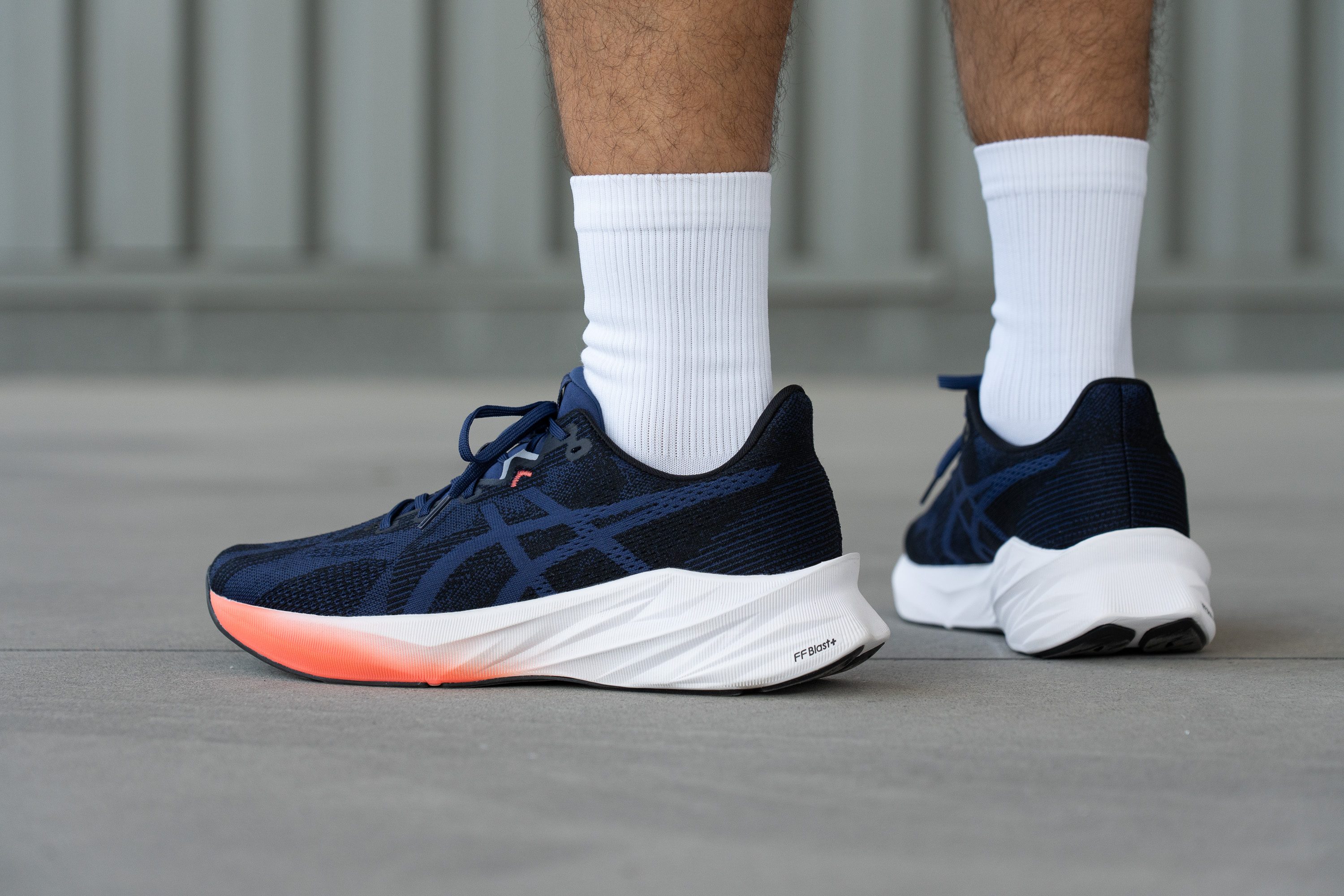
Who should NOT buy
We believe that the Dynablast 5 is not the best choice for runners seeking strong bounce or responsiveness. In our lab tests, we found that its FF Blast+ foam delivers low energy return, making the ride feel far from springy. If lively cushioning matters to you, we suggest looking at slightly pricier alternatives like the Adidas Supernova Rise 2 or the ASICS Novablast 5.
Additionally, we think the Dynablast 5 may not suit runners who need a roomy toebox. Our assessment indicates that its low-volume front can create some unwanted pressure, limiting comfort during longer runs. If space is a priority, we recommend the New Balance Fresh Foam X 880 v14, which offers a broader fit while maintaining excellent versatility for daily training.
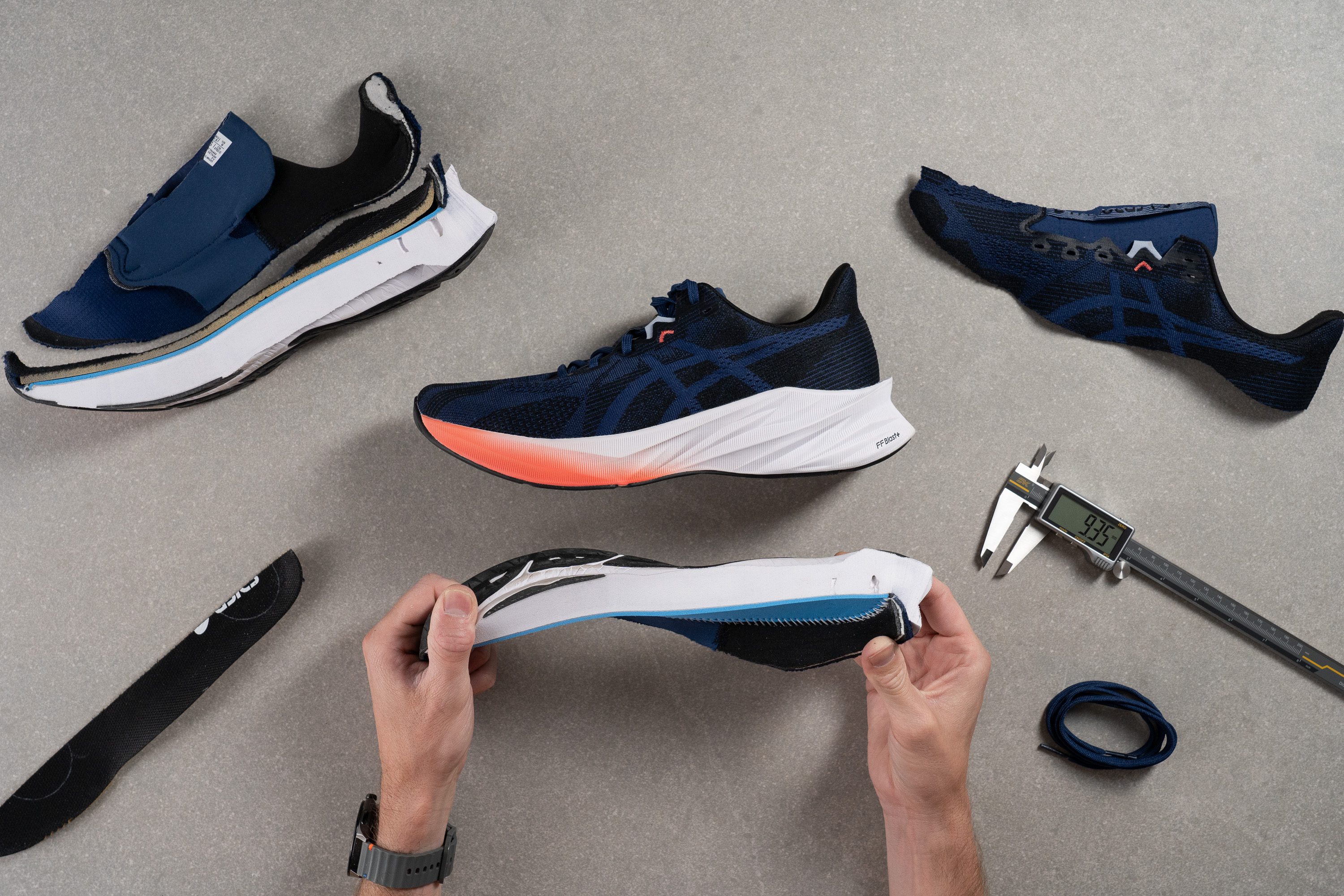
Cushioning
Shock absorption
The ASICS Dynablast 5 delivers outstanding shock absorption with 156 SA in the heel and 127 SA in the forefoot. These numbers are impressive on their own, but even more remarkable considering its low price compared to shoes with similar cushioning, like the New Balance Fresh Foam X More v5.
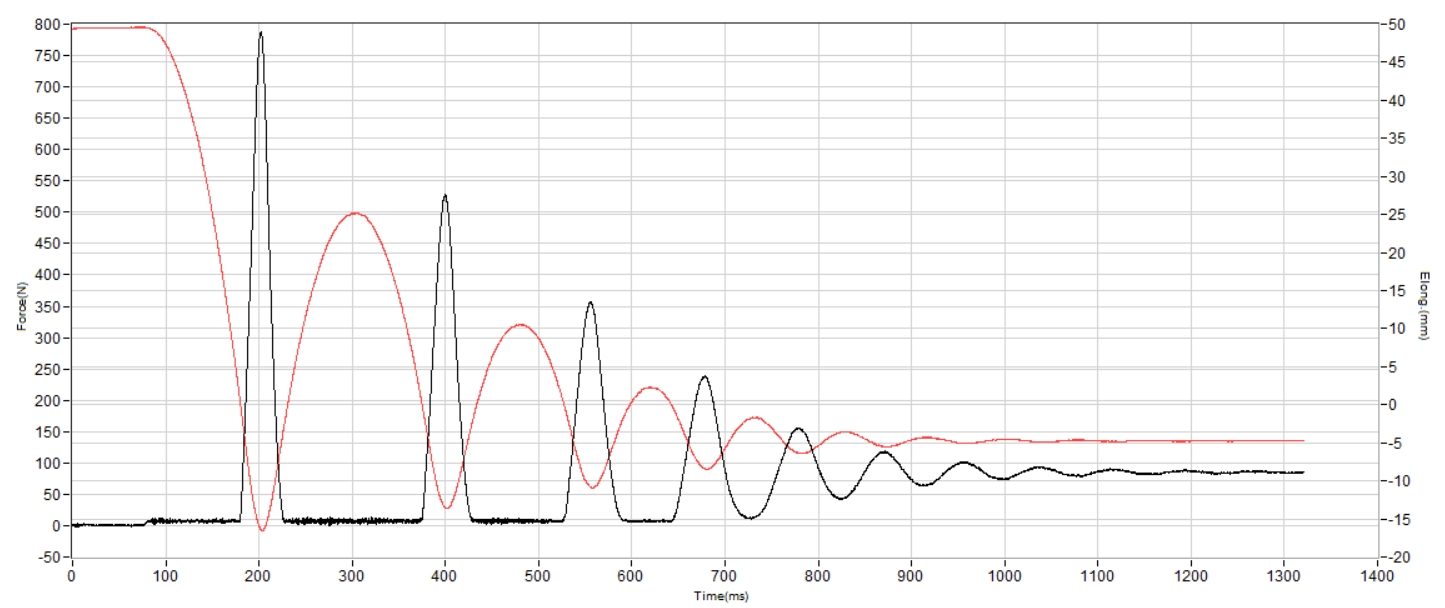
| Dynablast 5 | 156 SA |
| Average | 130 SA |
Energy return
The midsole does a great job protecting joints and muscles, but it doesn’t rebound like a spring. The FF Blast+ foam, similar to what’s found in models like the Nimbus 27, provides moderate-to-low energy return with just 54.0% in the heel and 58.8% in the forefoot.
While this level of performance feels underwhelming in higher-priced shoes, it’s not a red flag here considering the budget-friendly price point.
| Dynablast 5 | 54.0% |
| Average | 58.6% |
Heel stack
The Dynablast 5 is a clear example of how maximalist shoes are becoming the new standard in running. With a substantial 39.4 mm of foam, it provides more than enough cushioning to absorb the impact of even the most aggressive heel strikers.
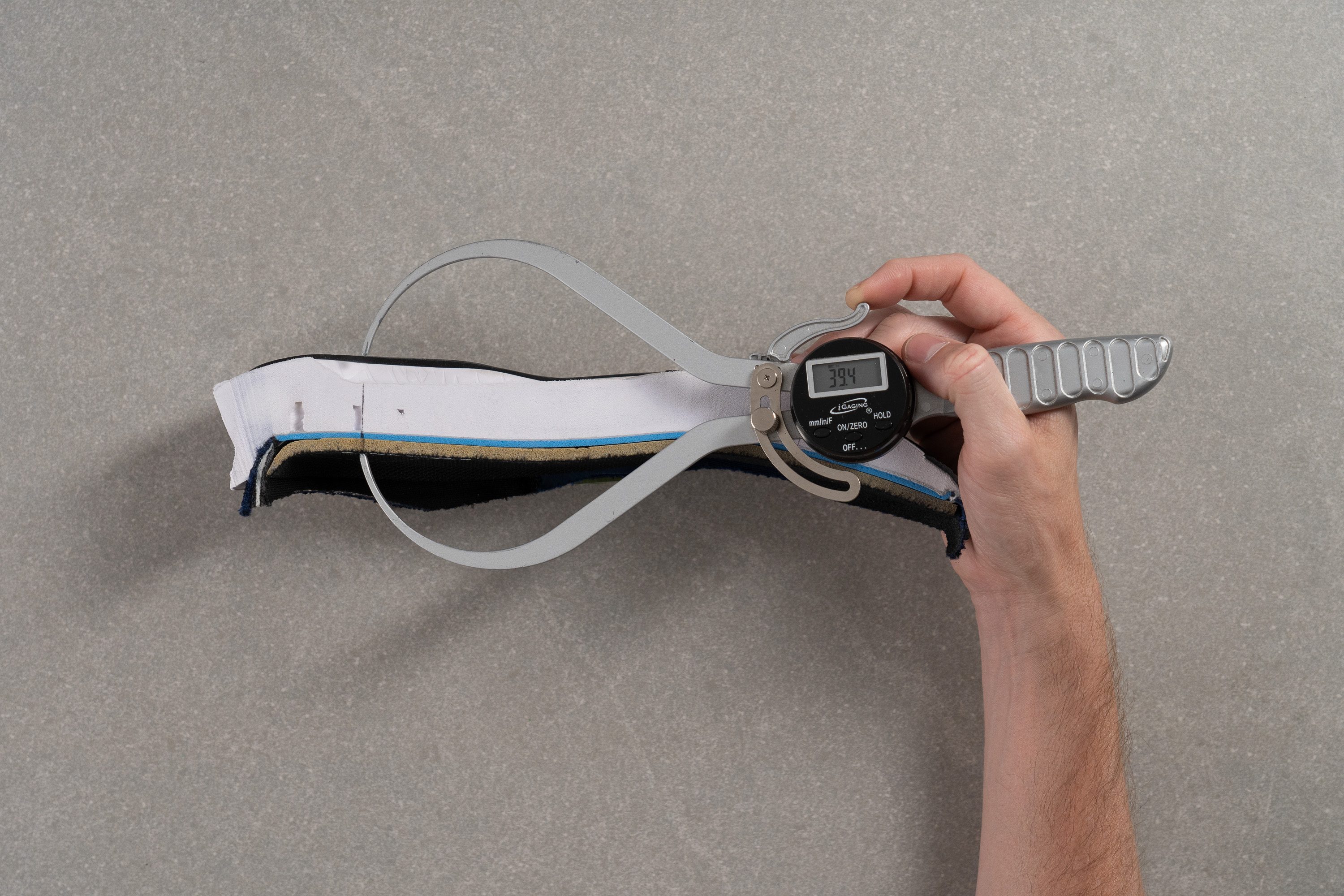
| Dynablast 5 | 39.4 mm |
| Average | 34.8 mm |
Forefoot stack
The forefoot also exceeds 30 mm, which we typically consider the threshold for a maximalist shoe. In the Dynablast 5, it measures 31.8 mm, unsurprising in the lab since we know the Novablast 3 so well... it was one of our favourite shoes of 2022!
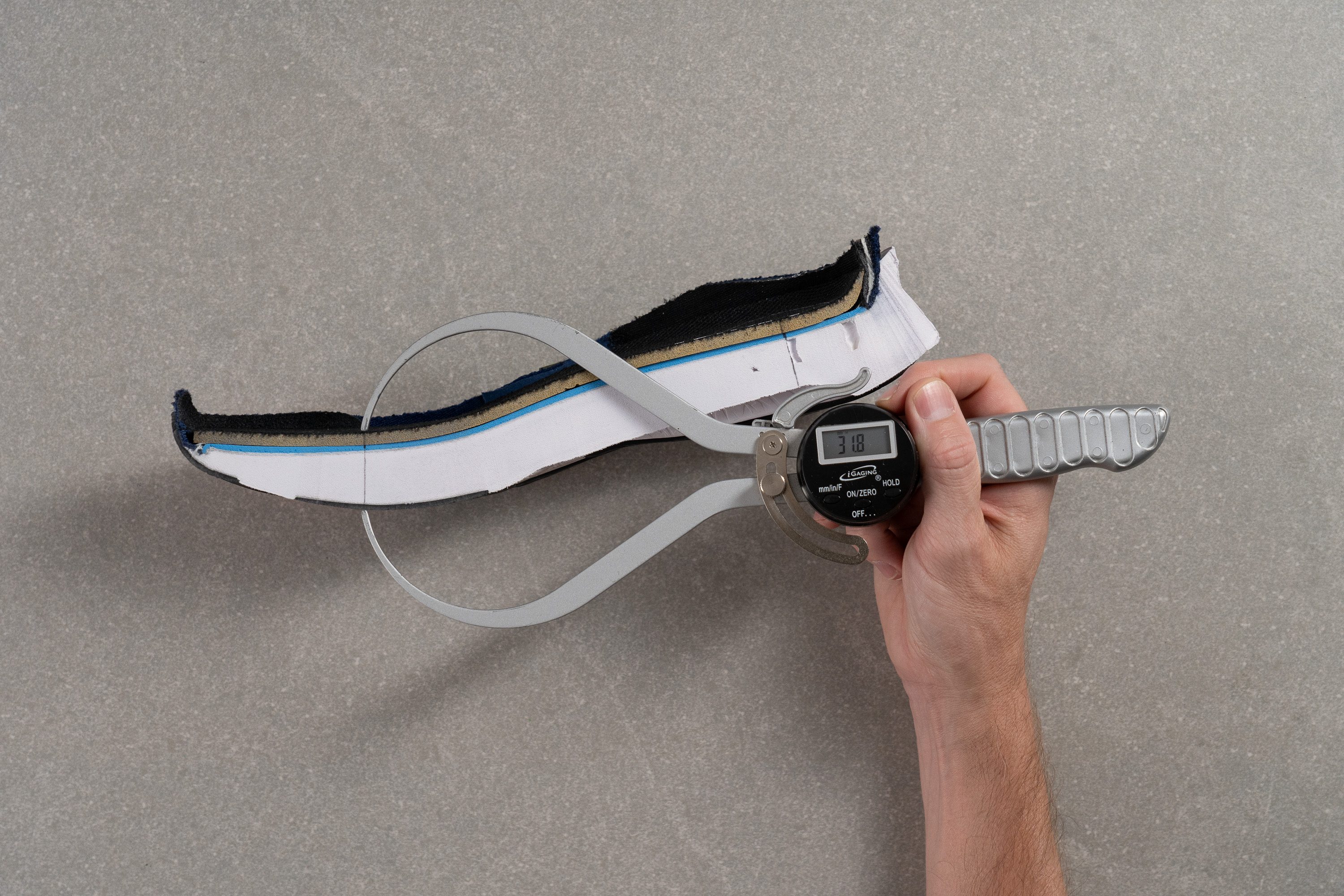
| Dynablast 5 | 31.8 mm |
| Average | 26.2 mm |
Drop
The Dynablast 5 is listed with an official drop of 8 mm, and our measurement came in at 7.6 mm, which is impressively accurate and sits comfortably within standard manufacturing tolerances. To put it into perspective, a difference of 0.4 mm is almost imperceptible, even if you hold a measuring tape against it.
With this moderate offset, the Dynablast 5 avoids extremes and delivers a safe, adaptable platform that works well for all footstrikes.
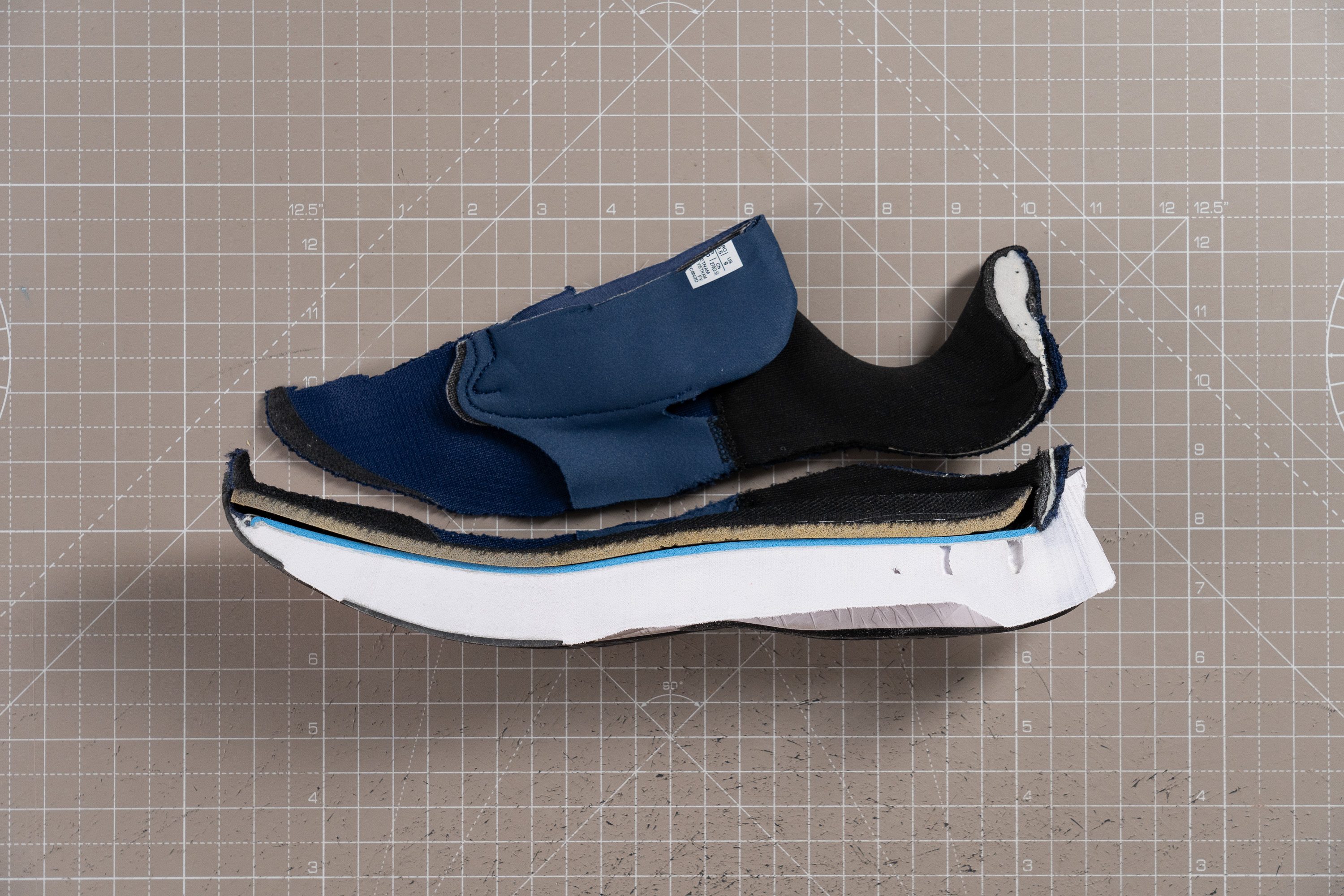
| Dynablast 5 | 7.6 mm |
| Average | 8.6 mm |
Midsole softness
NewThe FF Blast+ foam in the Dynablast 5 measures a moderate 36.6 AC, making it noticeably firmer more beginner-friendly than the Novablast 3.
This highlights, as we explained in our guide about foams, that two shoes can share the same branded foam yet use different formulations and densities. That’s why it’s important not to rely solely on the name, but instead on the actual softness and energy return measured in our lab.
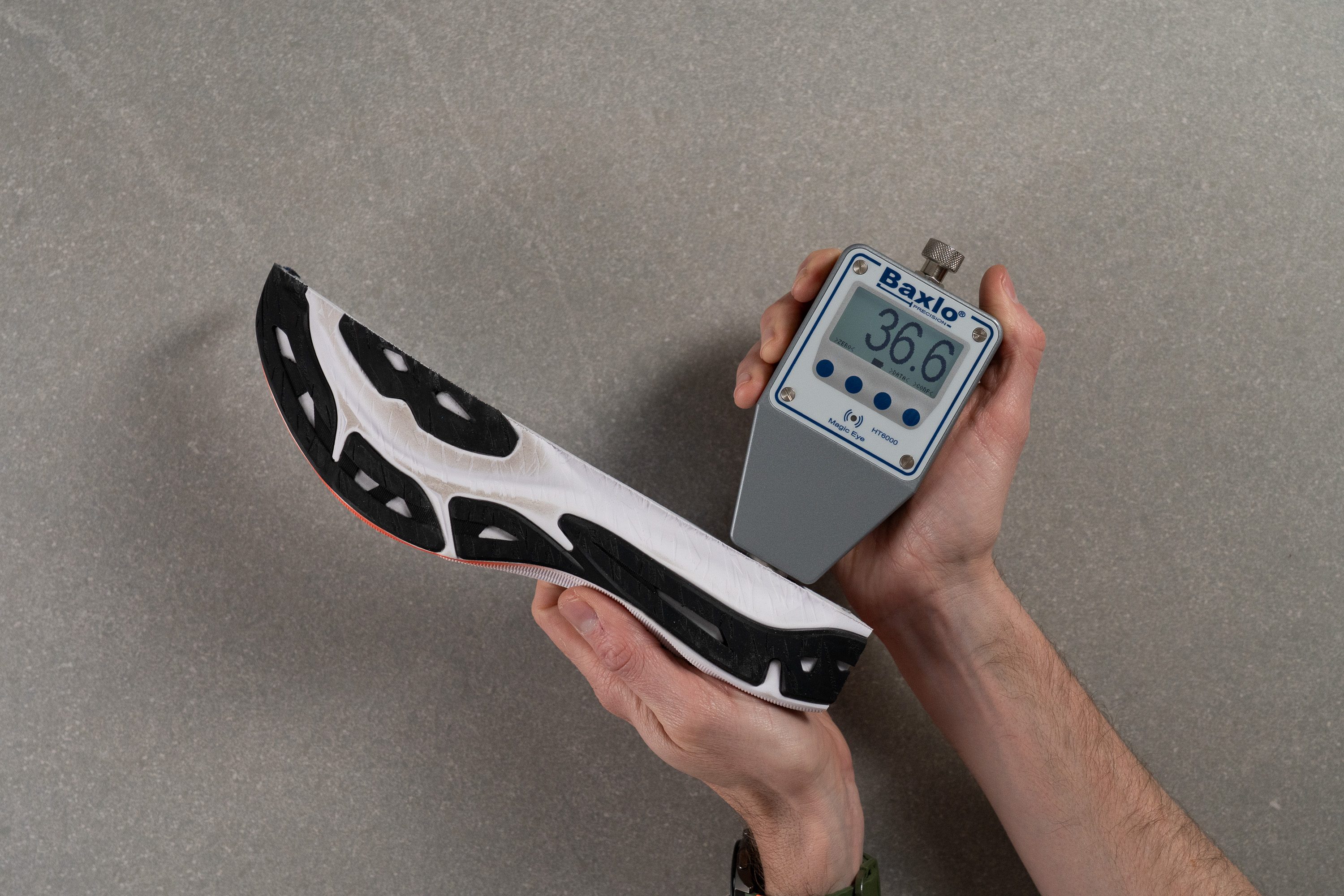
| Dynablast 5 | 36.6 AC |
| Average | 36.2 AC |
Rocker
The forefoot curves upward in a gentle way, which helps guide the foot forward and makes each step feel smoother.
We found during our runs that this design supports a natural roll into toe-off, so the transitions from landing to push-off feel fluid and consistent. It follows the same approach seen in the Novablast line, keeping the ride familiar for fans of that series. In fact, based on our measurements, the curvature is almost identical to the Novablast 5.
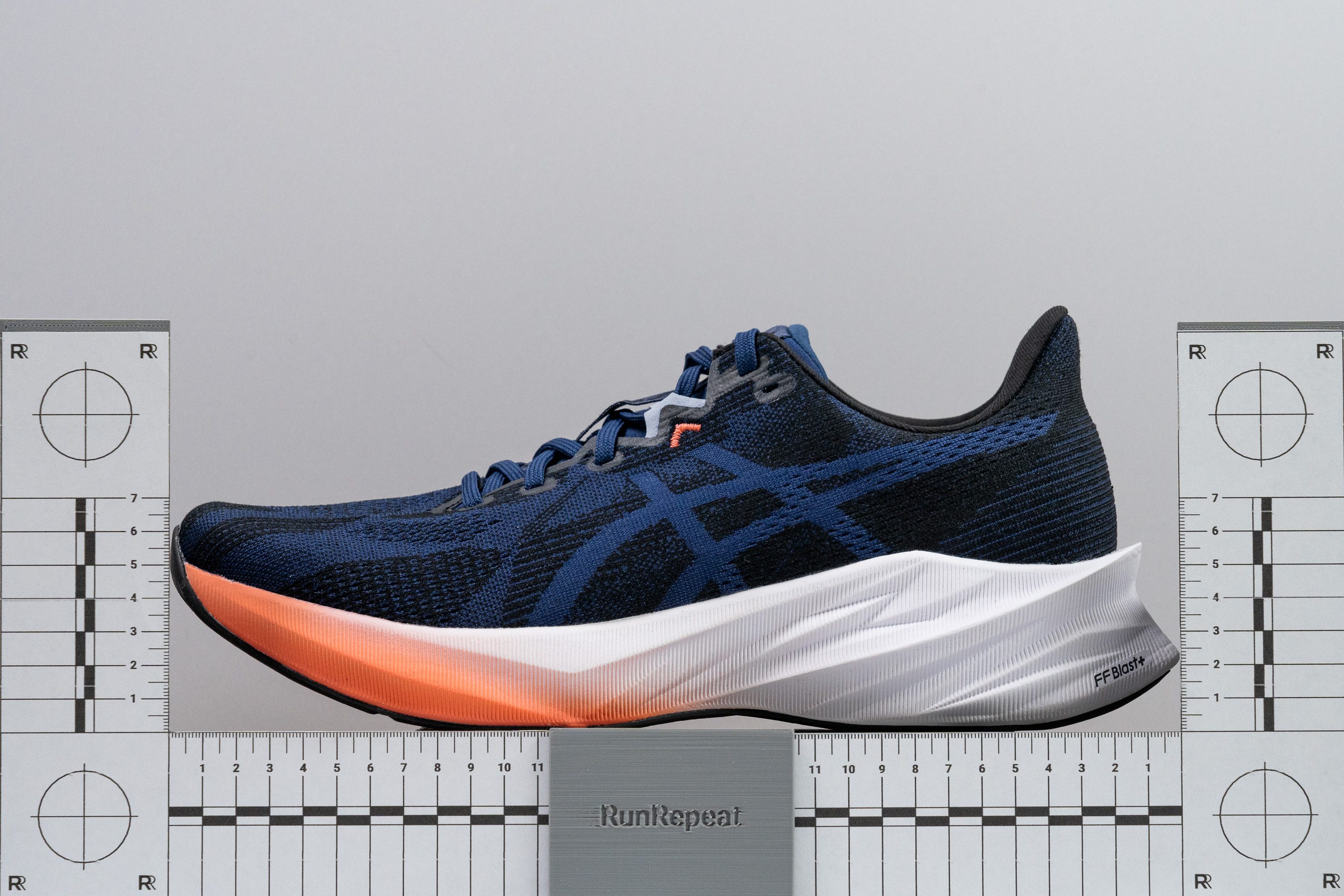
Size and fit
Size
ASICS Dynablast 5 fits true to size (27 votes).
Width / Fit
How does the Dynablast 5 fit? When we first tried it on, the shoe felt a bit snug and definitely not among the roomier options.
To back this up with data, we used our signature gel mould test. After solidifying in the freezer, the mould showed a width of 94.9 mm, which is right around the average we usually measure in the lab. Seems that we’ll need to look at the next measurement to see the full picture.
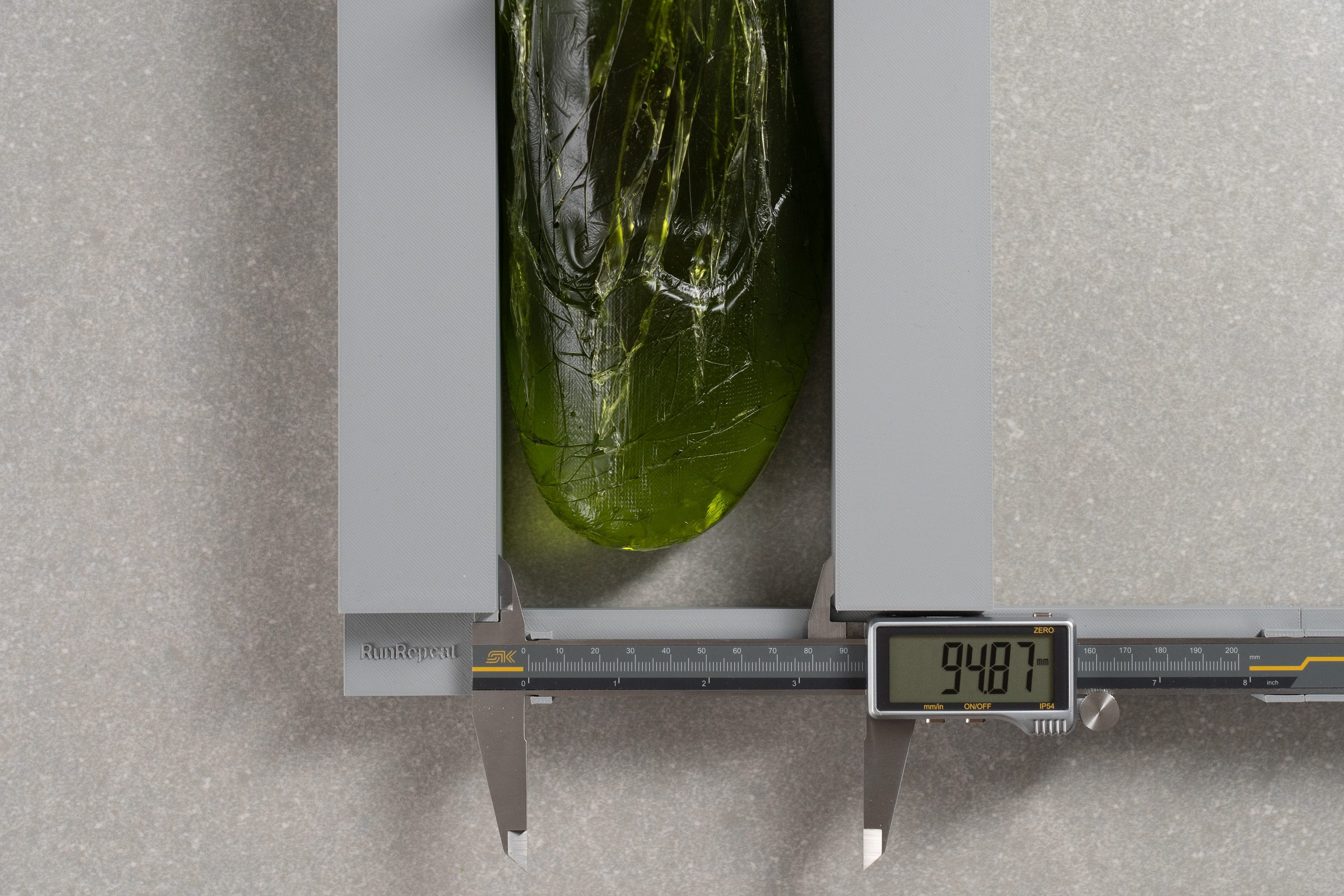
| Dynablast 5 | 94.9 mm |
| Average | 95.1 mm |
Toebox width
This measurement gave us more clarity, as it’s definitely below average. As a result, the Dynablast 5 feels slightly tight in the toebox, though not enough to be a deal-breaker for runners with average or narrow feet.
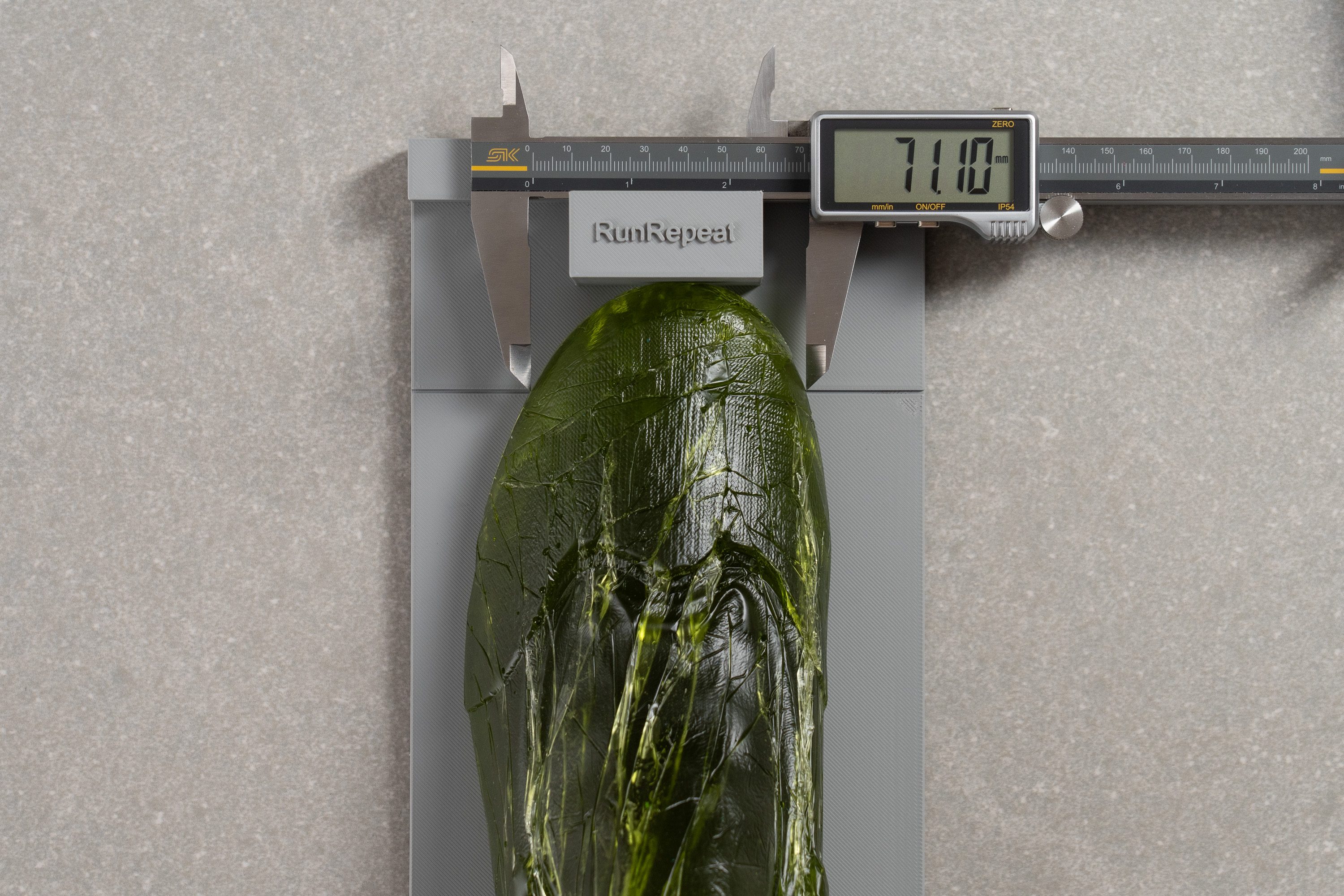
| Dynablast 5 | 71.1 mm |
| Average | 73.3 mm |
Toebox height
The toebox is fairly low at just 23.4 mm.
The mesh offers a bit of flexibility and isn’t uncomfortable, but we really think that this isn’t the shoe for those who enjoy freely wiggling their toes upward or hate a tight fit.
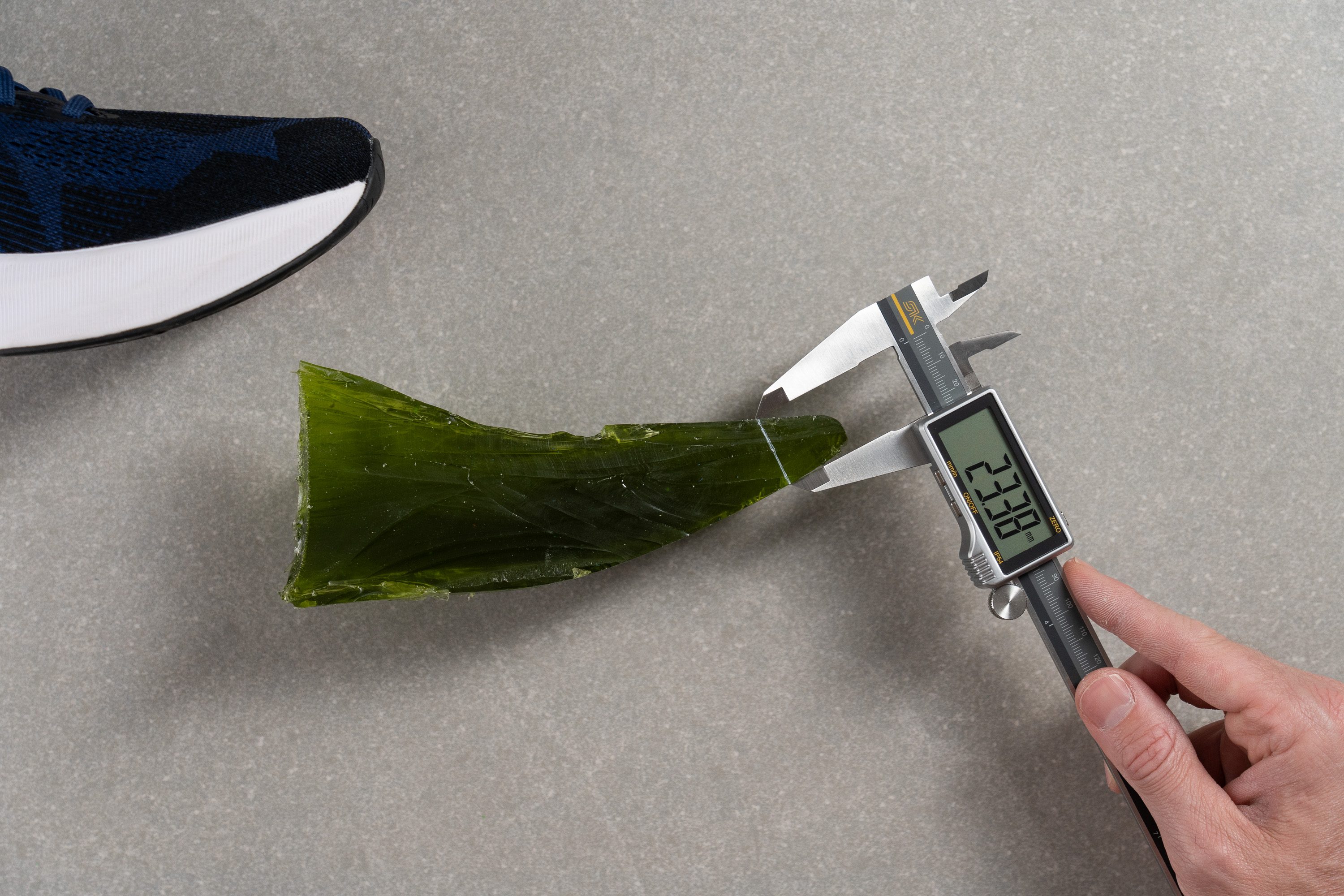
| Dynablast 5 | 23.4 mm |
| Average | 27.0 mm |
Traction / Grip
Traction test
The outsole of the Dynablast 5 mirrors the design of the Novablast 3 but swaps in a different rubber compound. While the Novablast 3 used AHAR+, this model features the updated AHAR LO.
In our wet-surface test, it scored 0.47, an impressive result that stands out given the shoe’s affordable price.
| Dynablast 5 | 0.47 |
| Average | 0.49 |
Outsole design
The outsole features AHAR LO rubber segments combined with broad areas of exposed midsole foam. Rubber runs along the entire perimeter, fully covering both medial and lateral sides, as well as the trampoline section in the forefoot. However, we know that those who prefer extensive rubber coverage might find the Dynablast 5 less appealing.
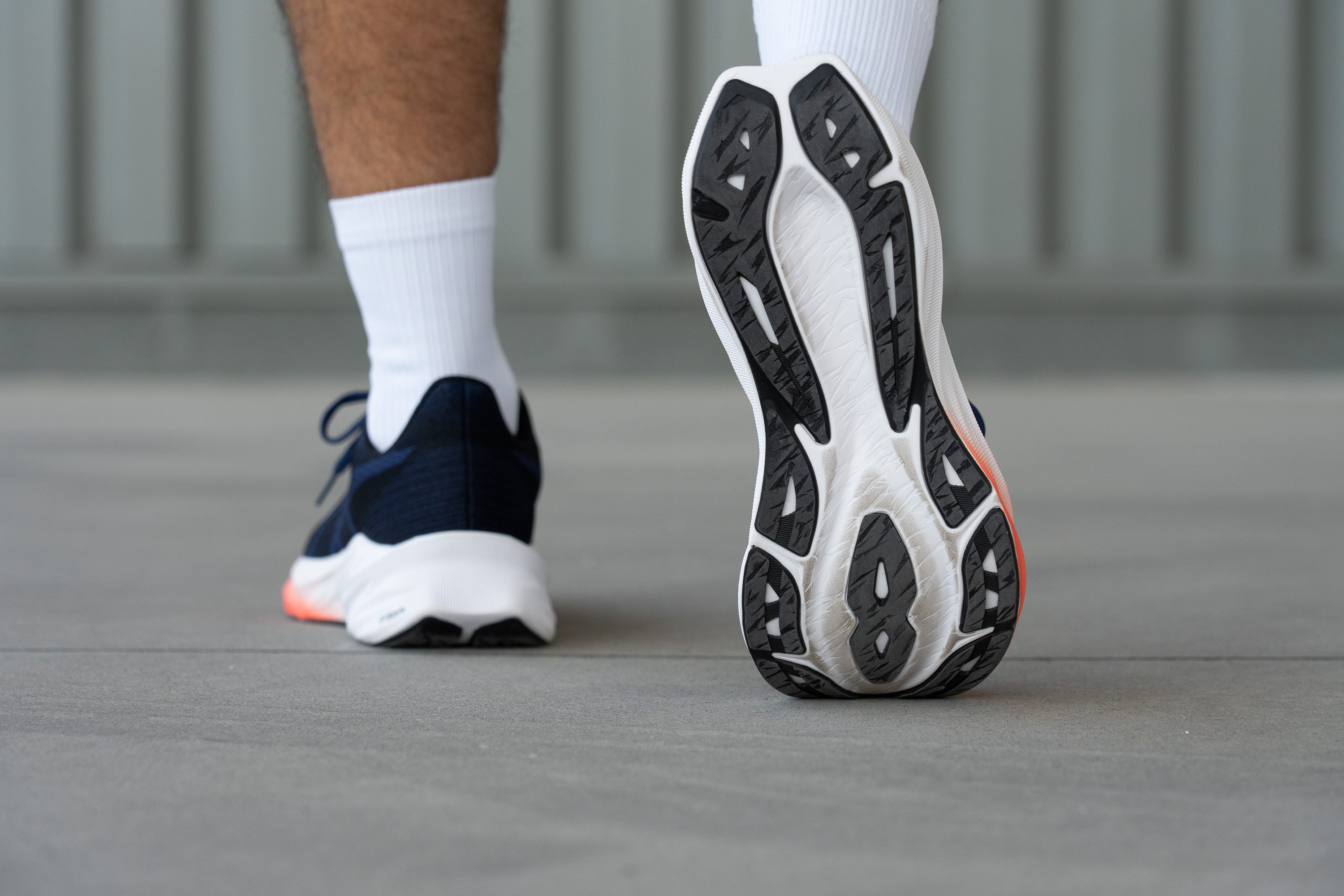
Flexibility / Stiffness
As a maximalist running shoe, the Dynablast 5 naturally carries more stiffness than a classic daily trainer. In our 30-degree bend test, it required 14.5N of force to reach that point, a noticeably higher value than what was common just a few years ago.
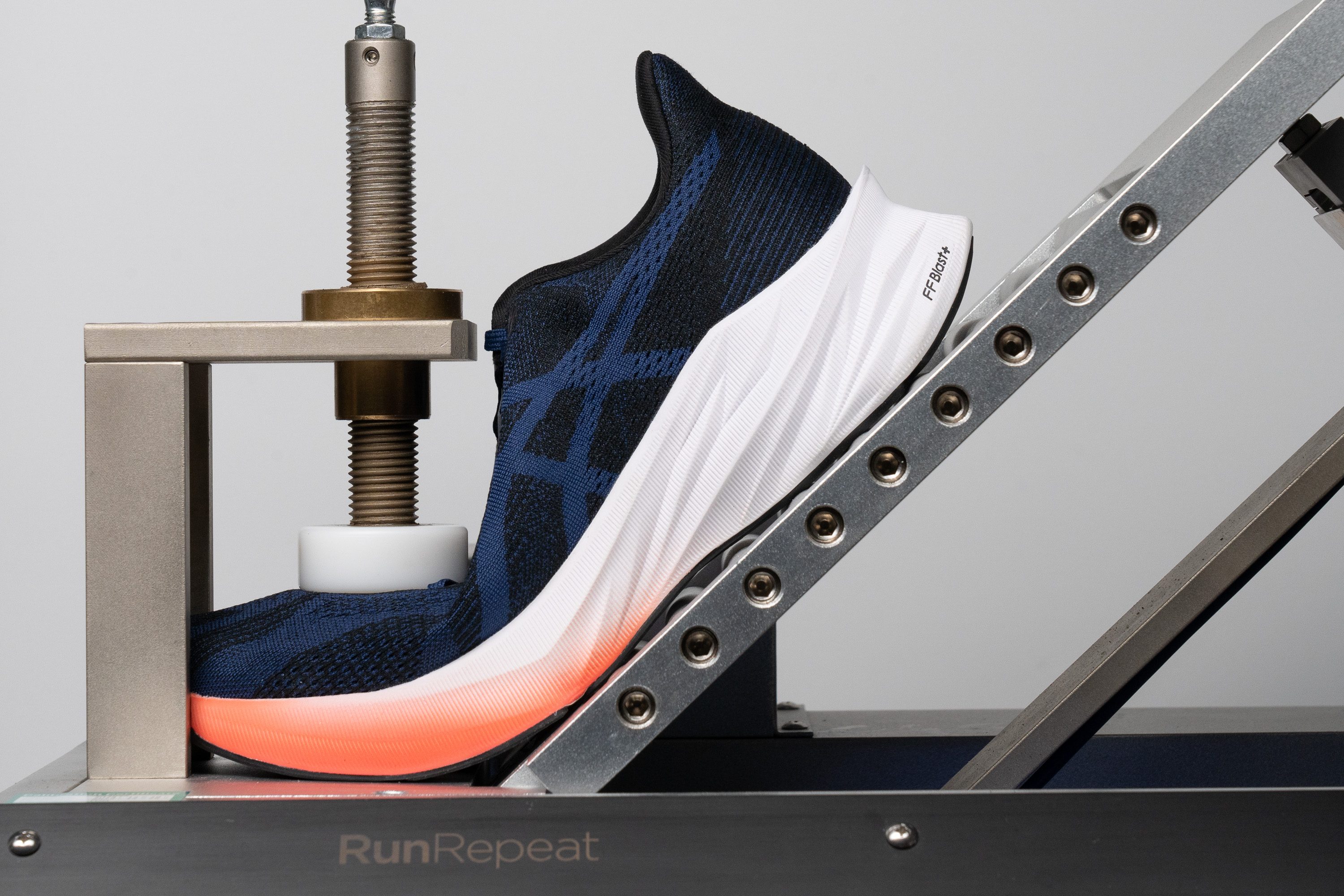
| Dynablast 5 | 14.5N |
| Average | 15.3N |
Weight
While the Dynablast 5 is nearly identical to the Novablast 3, subtle changes in the upper, outsole rubber, and foam density make it slightly heavier. The NB3 weighed 8.5 oz (242 g), while the Dynablast 5 comes in at 9.3 oz (264 g), which is 9% more. But still pretty good for its size!
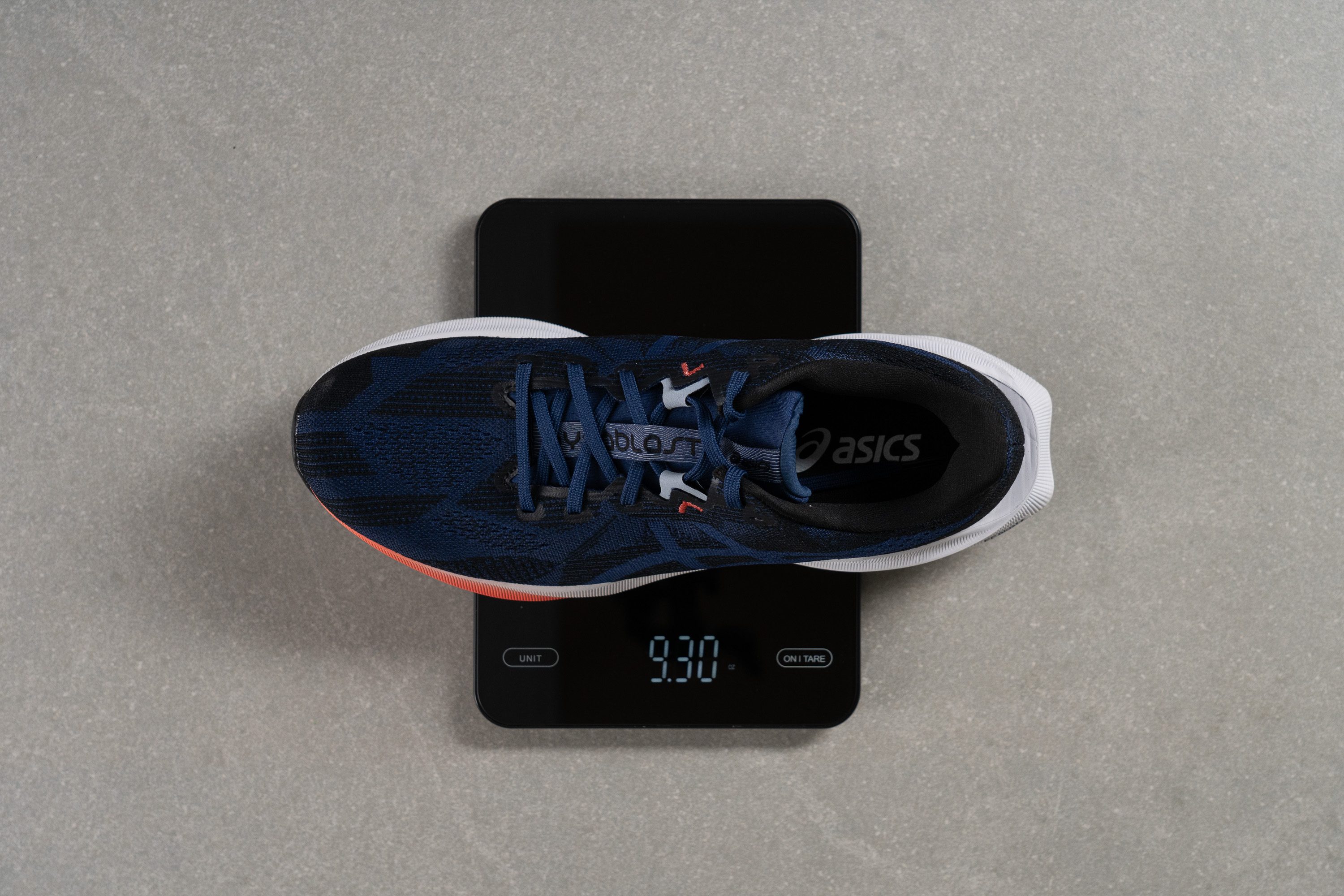
| Dynablast 5 | 9.3 oz (264g) |
| Average | 9.3 oz (264g) |
Breathability
One thing that worried us a bit was breathability, because visually it doesn’t look like one of those airy uppers that release air easily. But that’s exactly why we put every shoe through our machine tests.
After running the smoke test, we rated it 4/5. That’s a strong result for a jacquard mesh upper and makes it suitable for year-round use.
The dark colorway makes it seem less breathable when the upper is held to the light, but the gaps where the smoke escaped are clearly visible.
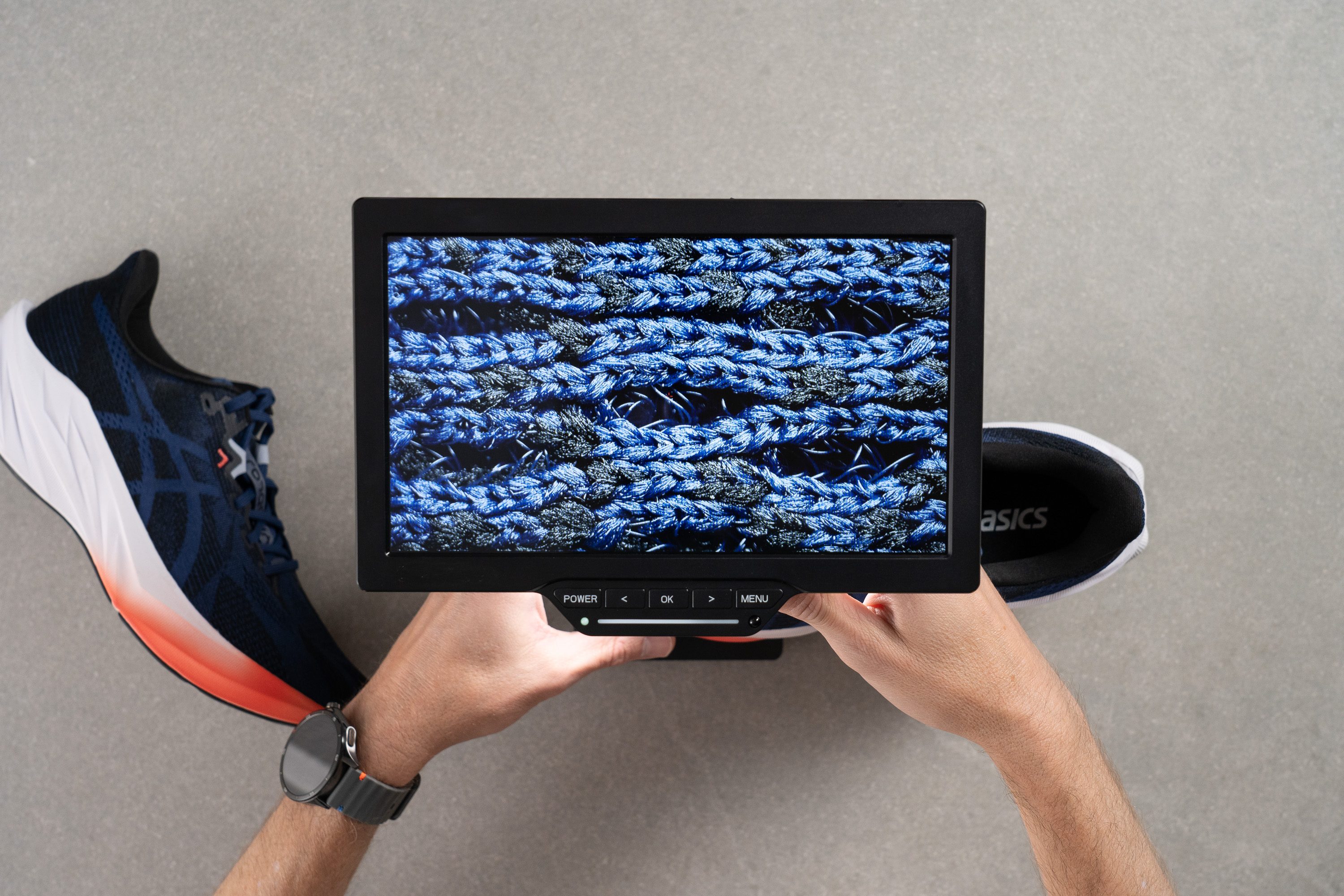
Under the microscope, the engineered mesh revealed a dense structure with plenty of ventilation holes.
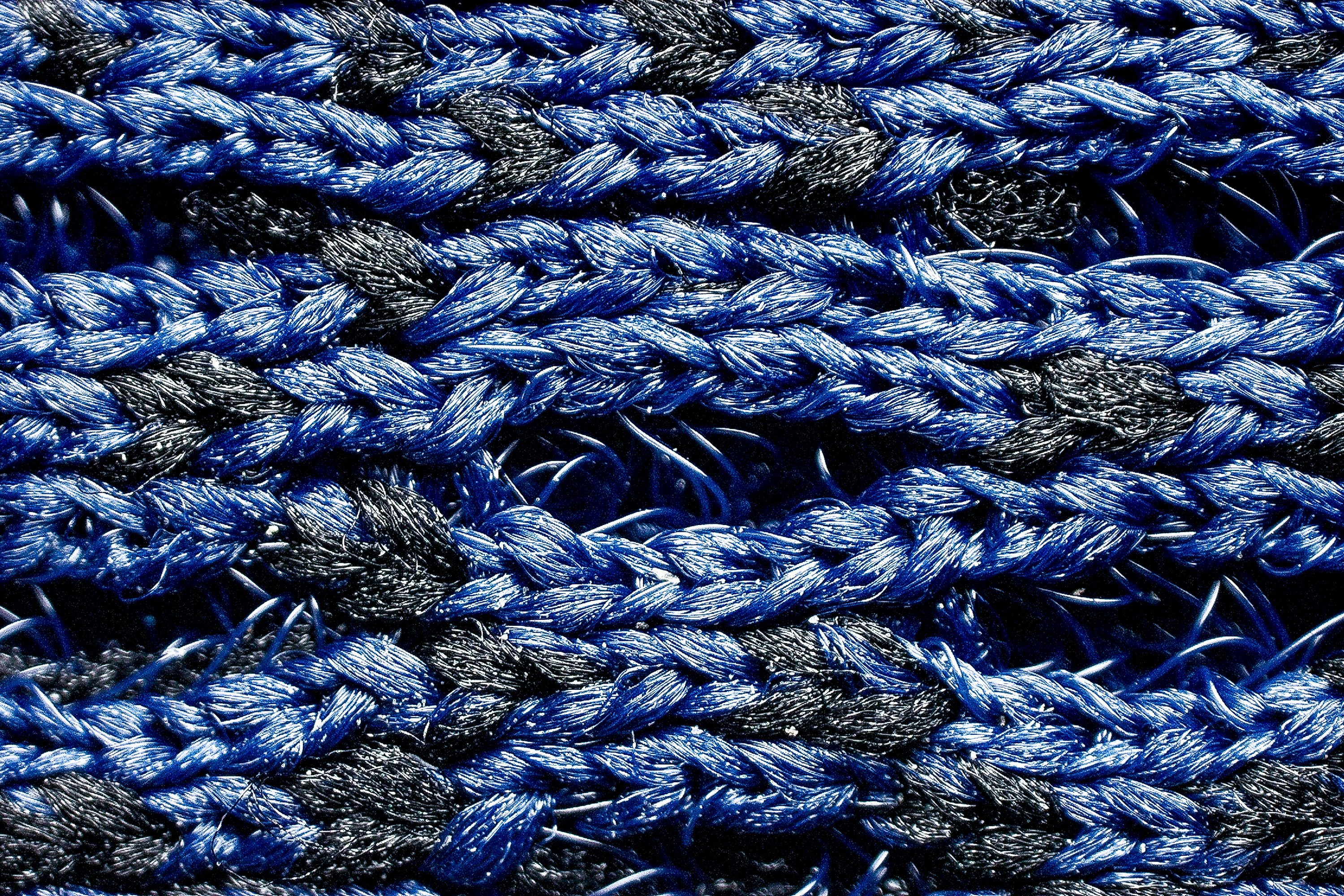
It’s not the first jacquard mesh to surprise us positively in this area, and it’s rare to see an upper like this at this price.
The upper also stands out for its build quality and materials at this level. The padding is consistent, stitching is clean, and there are no glue marks or flaws to note.
| Dynablast 5 | 4 |
| Average | 3.7 |
Stability
Lateral stability test
One common complaint about the Novablast 3 was its slight instability, but the Dynablast 5 feels more controlled thanks to its firmer, denser FF Blast+ foam. Even so, we recommend it only for neutral runners given its maximalist stack height.
Torsional rigidity
Just like with its longitudinal stiffness, the Dynablast 5 also shows notable torsional rigidity. We rated it 4/5, which has essentially become the new standard for daily trainers.
| Dynablast 5 | 4 |
| Average | 3.5 |
Heel counter stiffness
The heel counter is slightly stiffer than the average shoe at 4 out of 5, designed to add a touch of stability for heel strikers. Fortunately, ASICS balanced this by packing the area with plenty of foam, making it feel very comfortable.
| Dynablast 5 | 4 |
| Average | 2.9 |
Midsole width - forefoot
We found that the Dynablast 5 gives a more secure feel for forefoot strikers, and the numbers explain why.
In our tests, the forefoot measured 118.4 mm—slightly above the average yet still under the 120 mm threshold reached by most stability shoes. This extra width creates a stable platform without crossing into oversized territory.
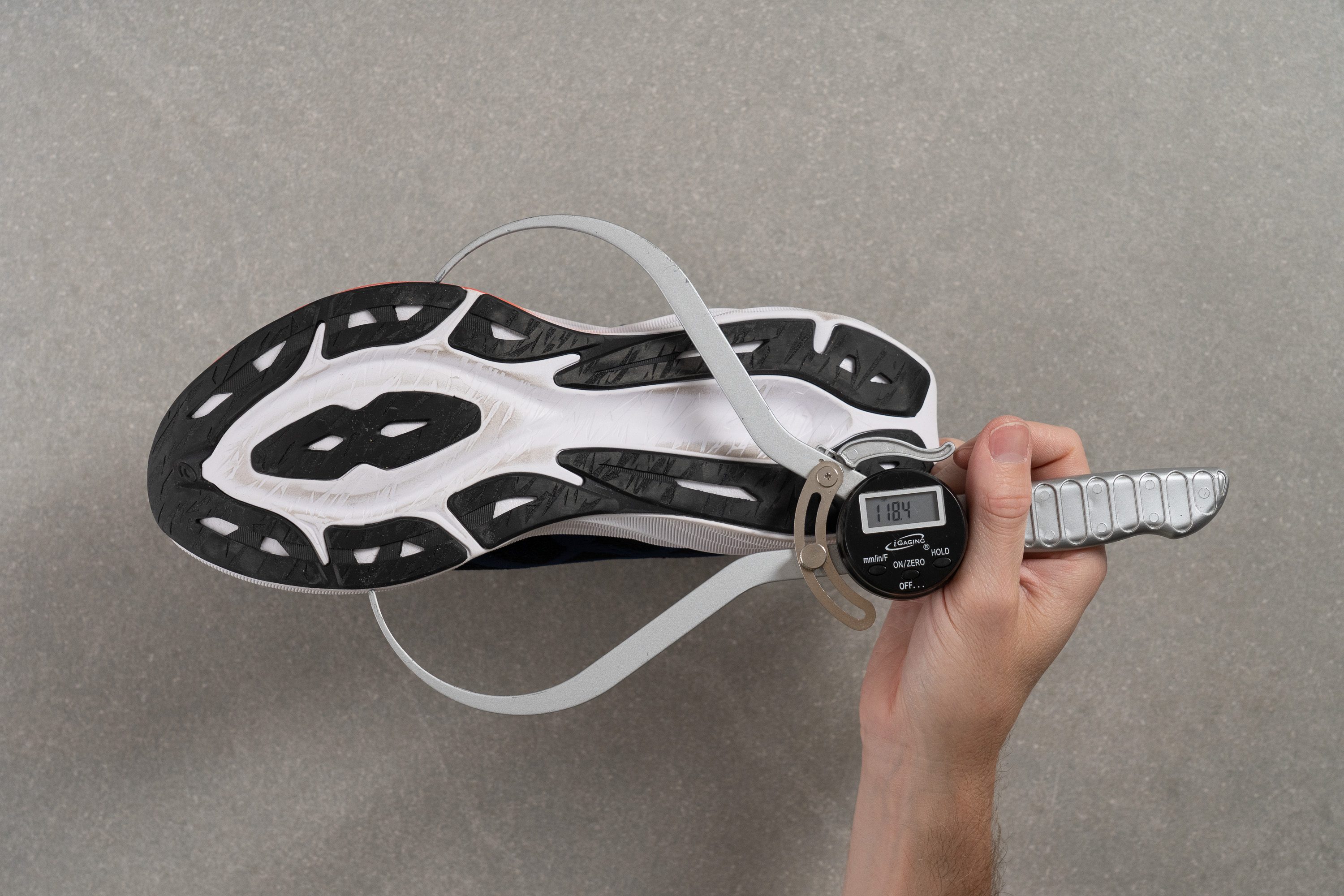
| Dynablast 5 | 118.4 mm |
| Average | 114.4 mm |
Midsole width - heel
The heel is less bulky, which helps maintain a good balance between the shoe’s weight and agility. We measured it at 90.7 mm, placing it right around the average.
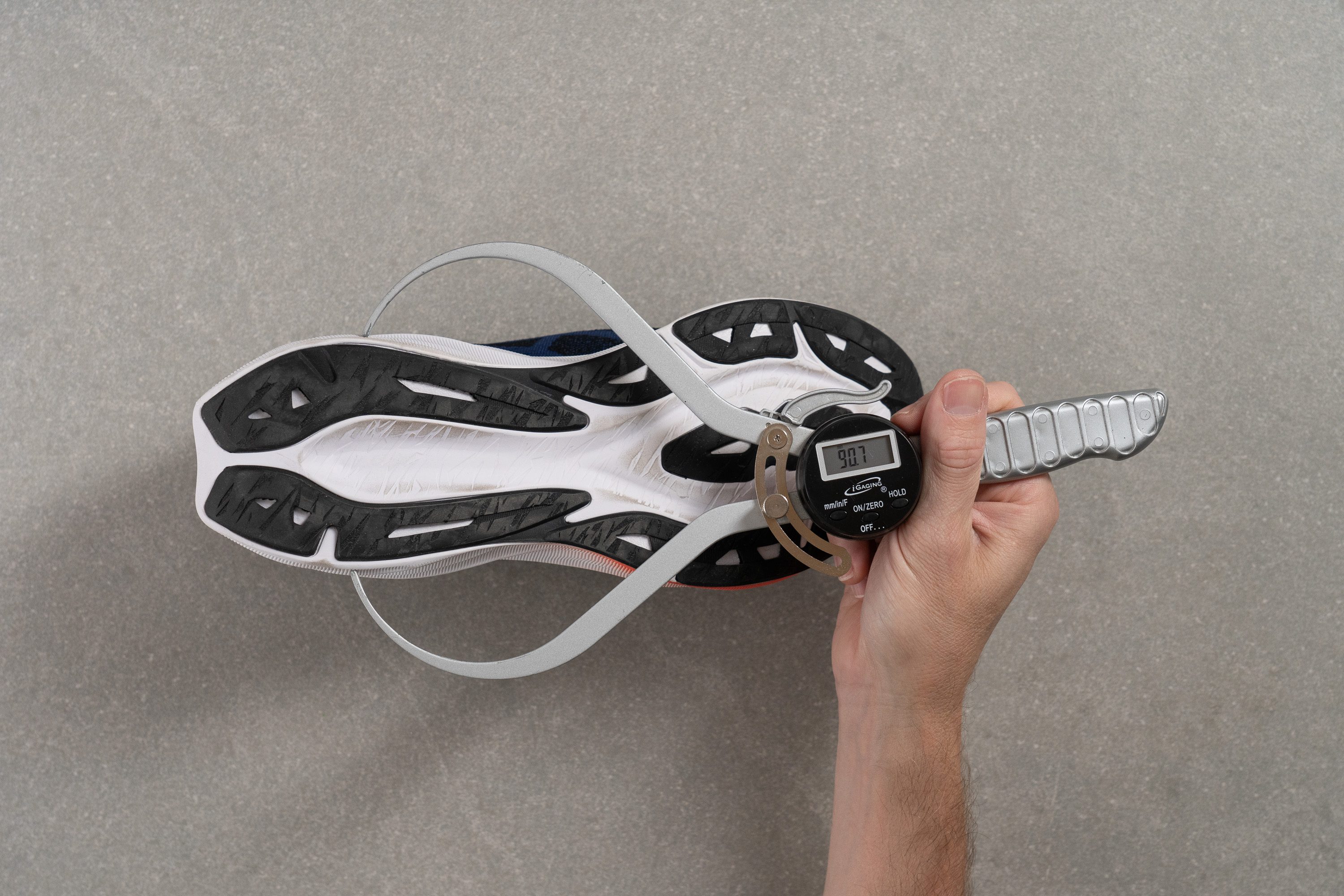
| Dynablast 5 | 90.7 mm |
| Average | 90.6 mm |
Durability
Toebox durability
We already discovered that the Dynablast 5 offers solid comfort and good breathability. But is the upper durable enough? To find out, we ran our Dremel test and recorded an impressive 4/5 score, showing it checks all the boxes.
| Dynablast 5 | 4 |
| Average | 2.6 |
Heel padding durability
This shoe seems to love scoring 4 out of 5, as the heel padding reached the same mark. We’re pleased with this result, since it keeps adding extra value to what is already a bargain shoe.
| Dynablast 5 | 4 |
| Average | 3.4 |
Outsole durability
The durability trifecta was completed with the outsole test, where we measured just 0.8 mm of damage. This result is especially important for the Dynablast 5, considering its limited outsole coverage.
| Dynablast 5 | 0.8 mm |
| Average | 1.1 mm |
Outsole thickness
To play it safe, ASICS increased the outsole thickness from 3.1 mm in the Novablast 3 to 3.6 mm in the Dynablast 5. It’s a smart adjustment, as buyers of this shoe will likely expect solid durability.
We already explained in other reviews that the running shoe market can sometimes be paradoxical: the pricier the shoe, the less the runner usually cares about durability! And here we got the opposite scenario.
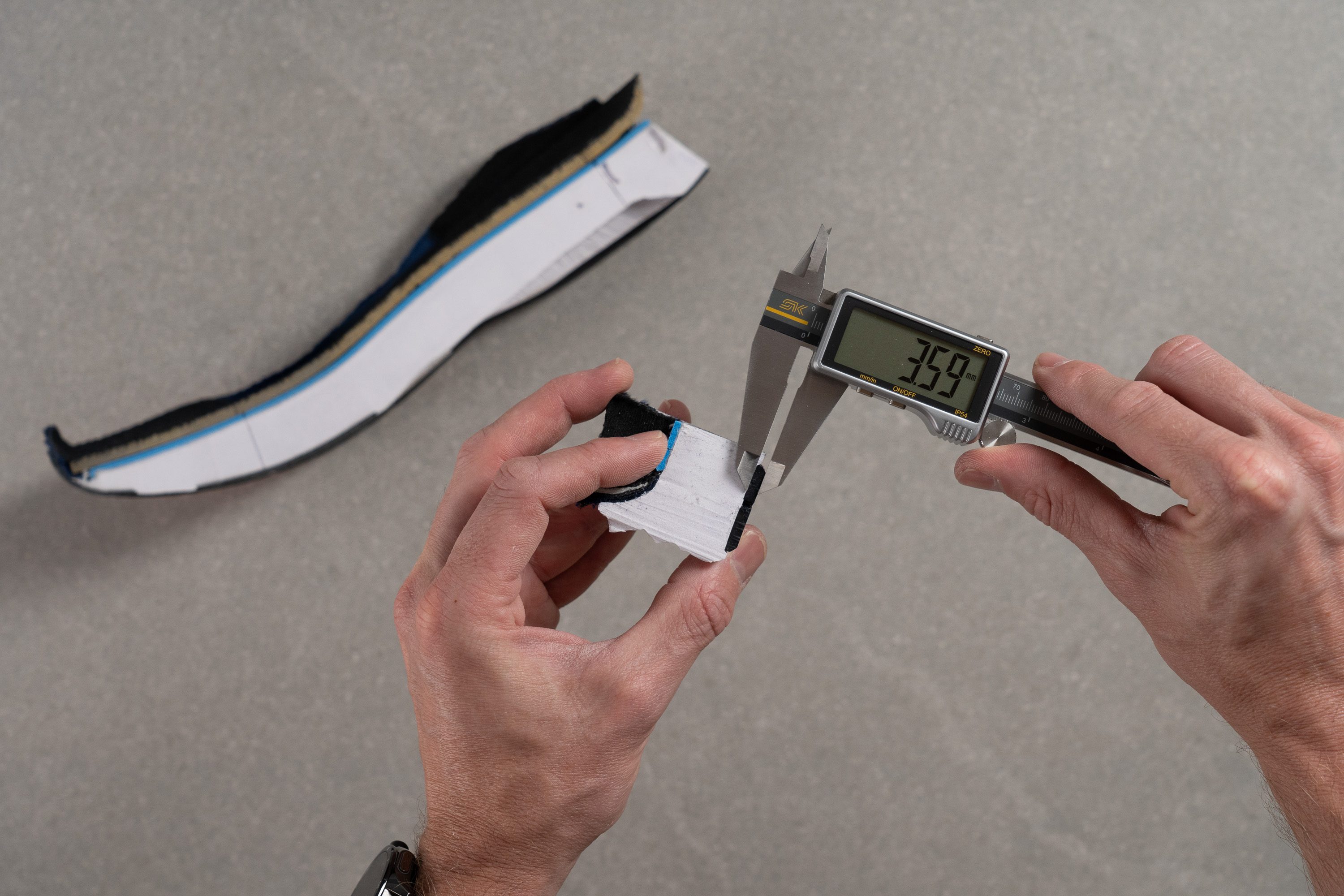
| Dynablast 5 | 3.6 mm |
| Average | 3.2 mm |
Misc
Insole thickness
The Ortholite X-30 insole adds noticeable cushioning to the ride thanks to its slightly thicker build compared to standard insoles.
Interestingly, the sockliner is made using a process that cuts water usage by about 33% and carbon emissions by roughly 45% versus traditional dyeing methods, which is cool!
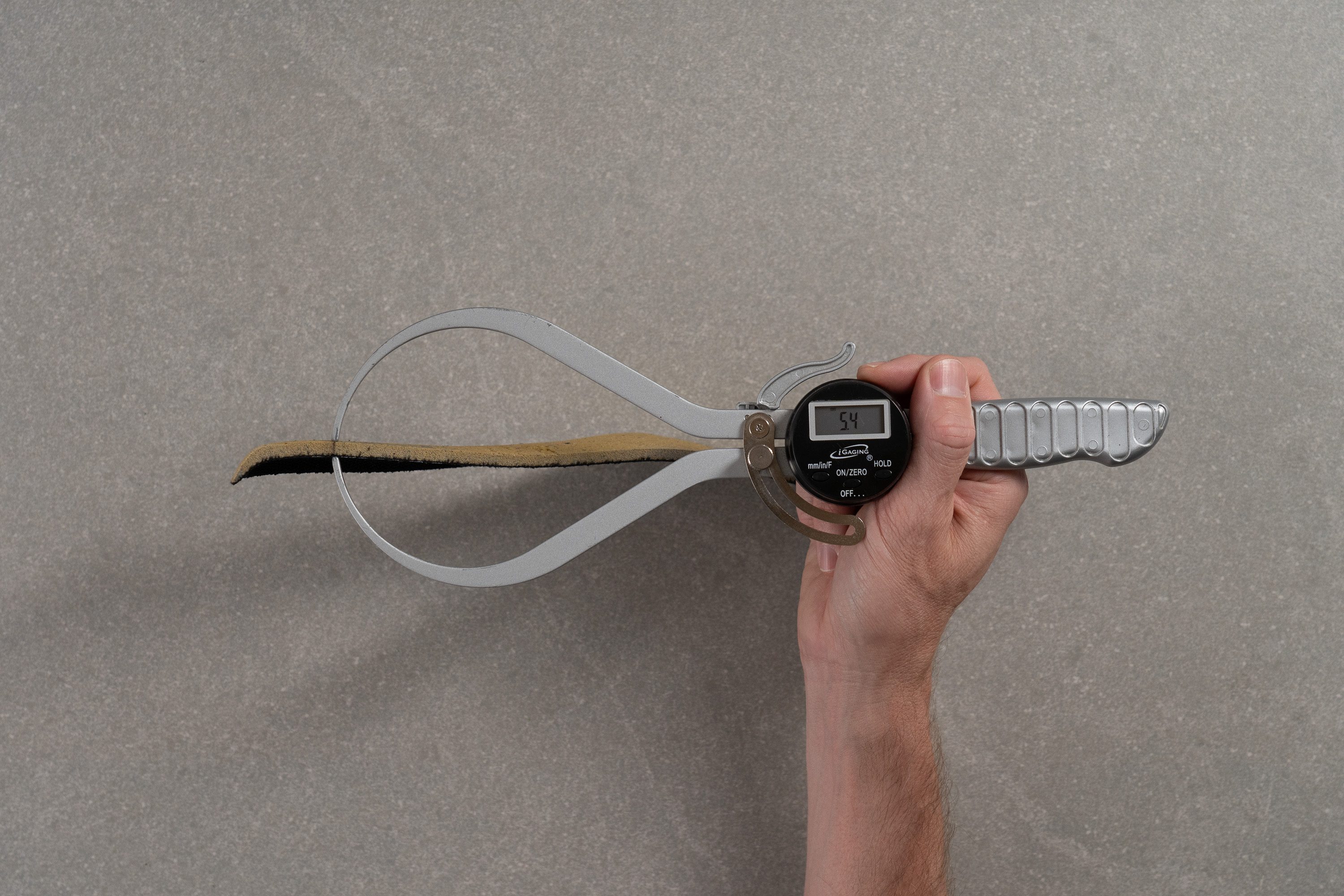
| Dynablast 5 | 5.4 mm |
| Average | 4.5 mm |
Removable insole
The removable Ortholite insole of the Dynablast 5 can be easily swapped for custom orthotics or a footbed from another model that better matches your preferences.
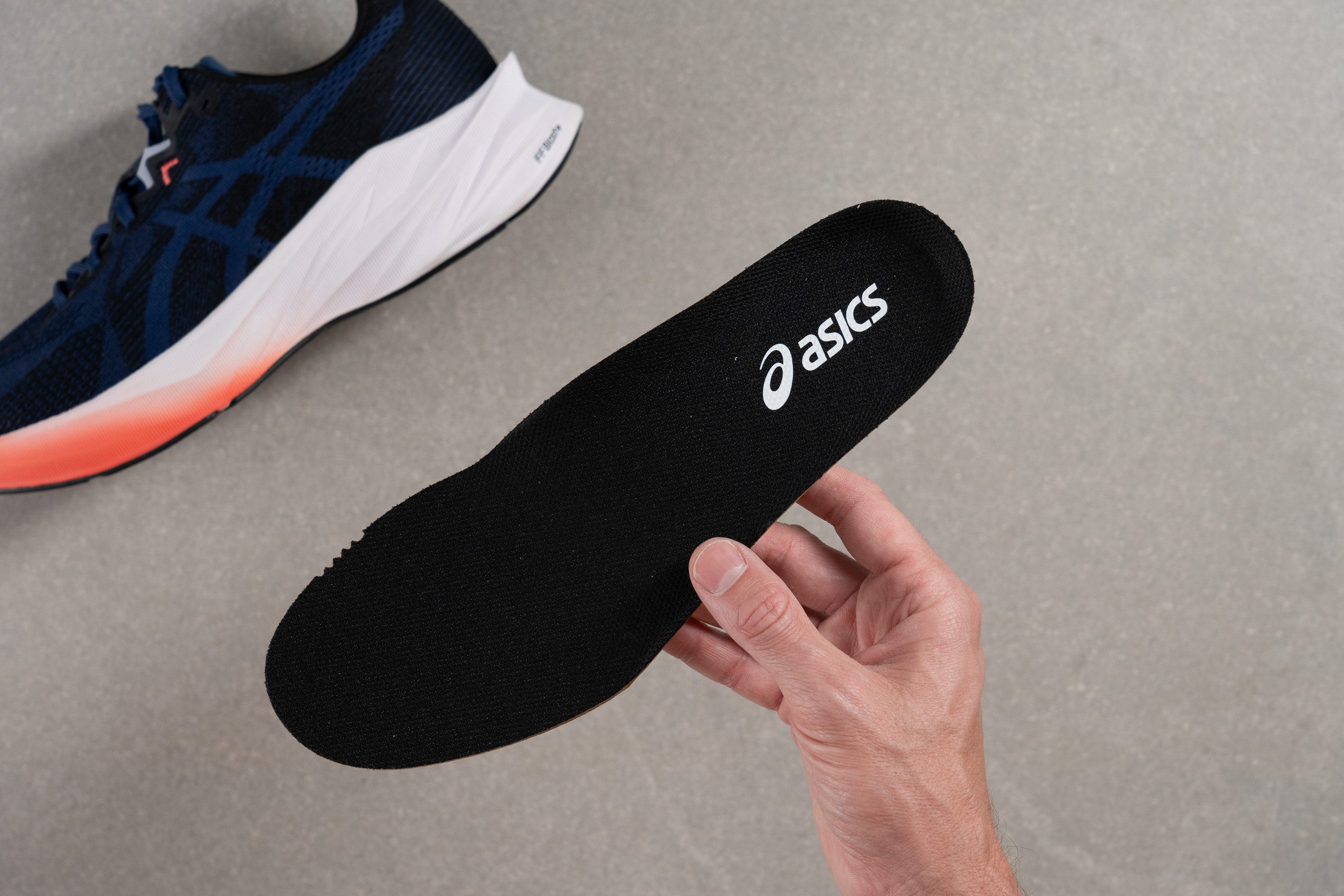
| Dynablast 5 | Yes |
Midsole softness in cold (%)
FF Blast+ is an EVA-based foam, which often struggles in cold conditions as it tends to firm up. However, the Dynablast 5 only became 27% firmer, which is a solid result.
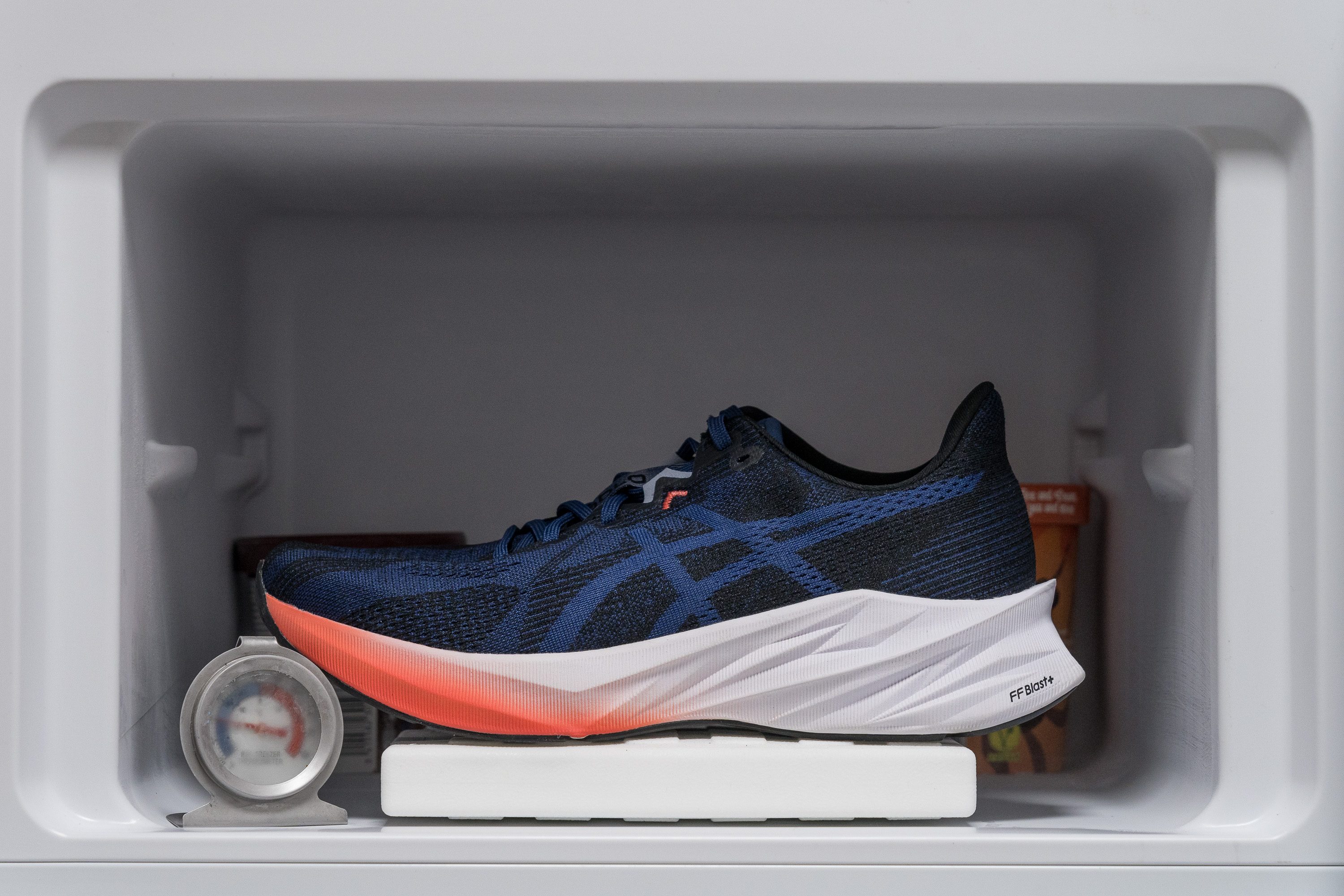
| Dynablast 5 | 27% |
| Average | 24% |
Reflective elements
The Dynablast 5 lacks reflective elements, which isn’t surprising, though ASICS could have easily included some even if the shoe is based on a previous model.
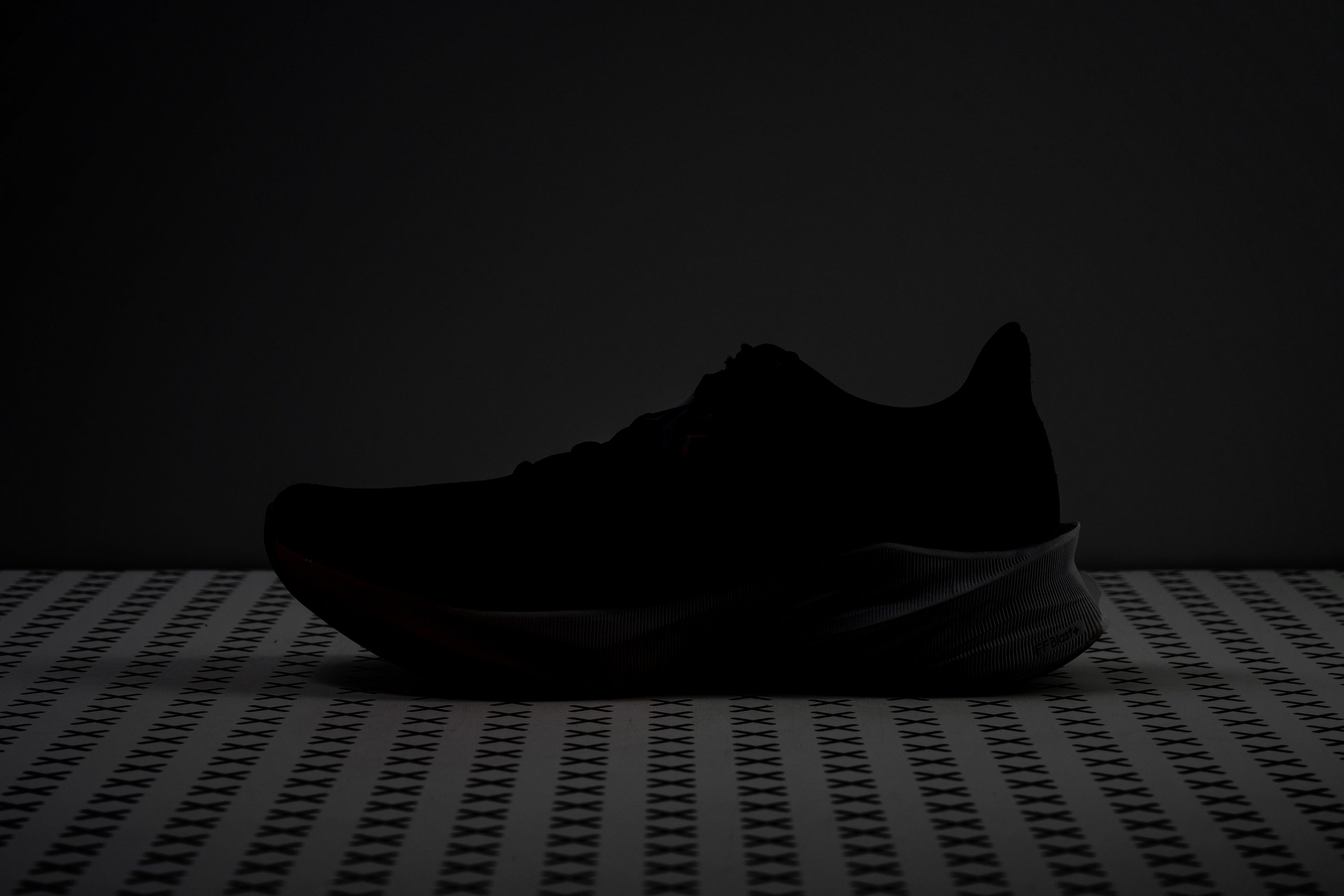
| Dynablast 5 | No |
Tongue padding
The tongue received a slight redesign and contributes to the Dynablast 5 being heavier than the Novablast 3. It now features 3.9 mm of padding compared to the previous 1.3 mm, offering better pressure relief and added comfort for daily use.
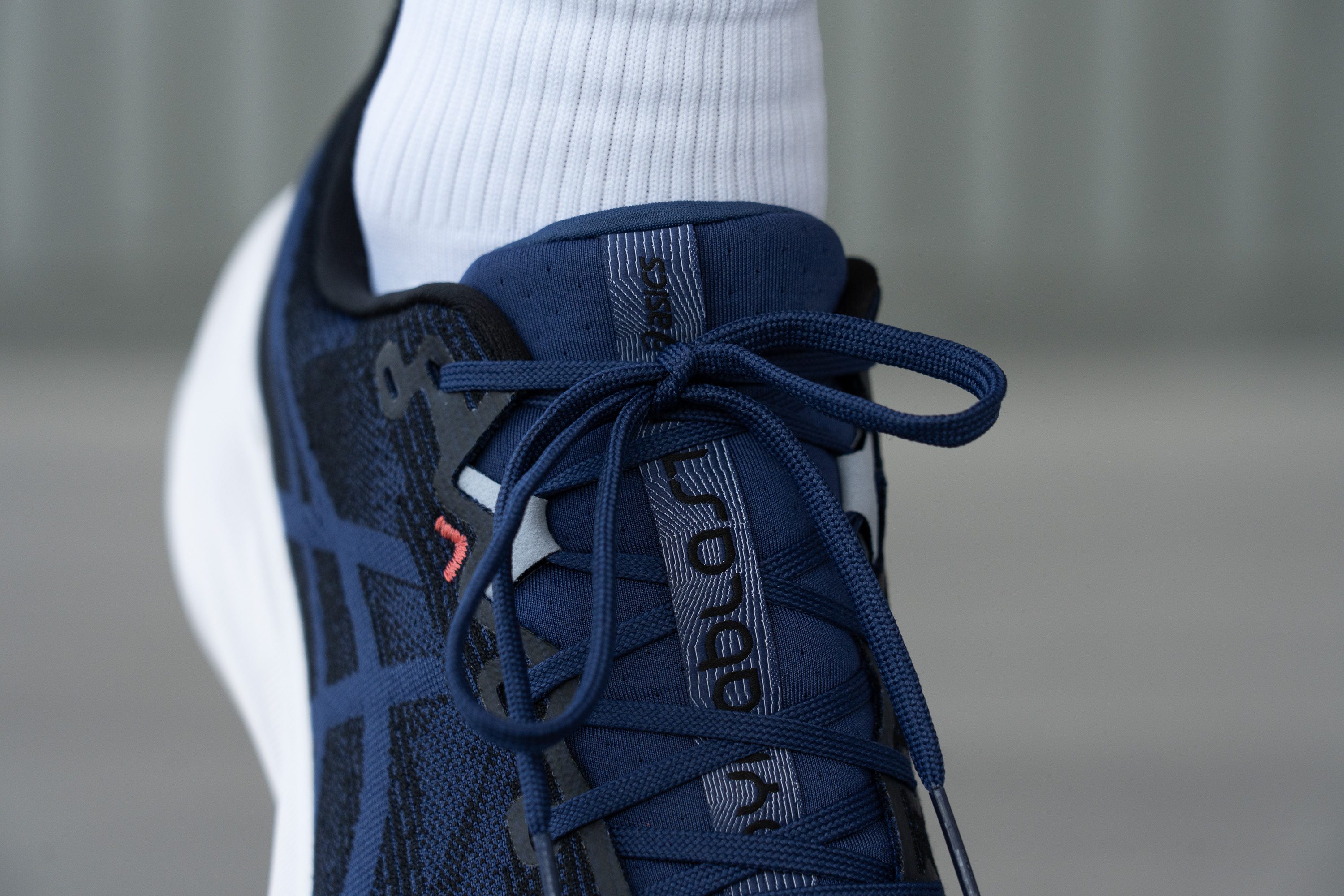
The lacing system was also updated, using punched eyelets with one lace loop that helps redistribute pressure more effectively. This detail not only looks cleaner but also adds a subtle premium touch to the shoe’s overall design.
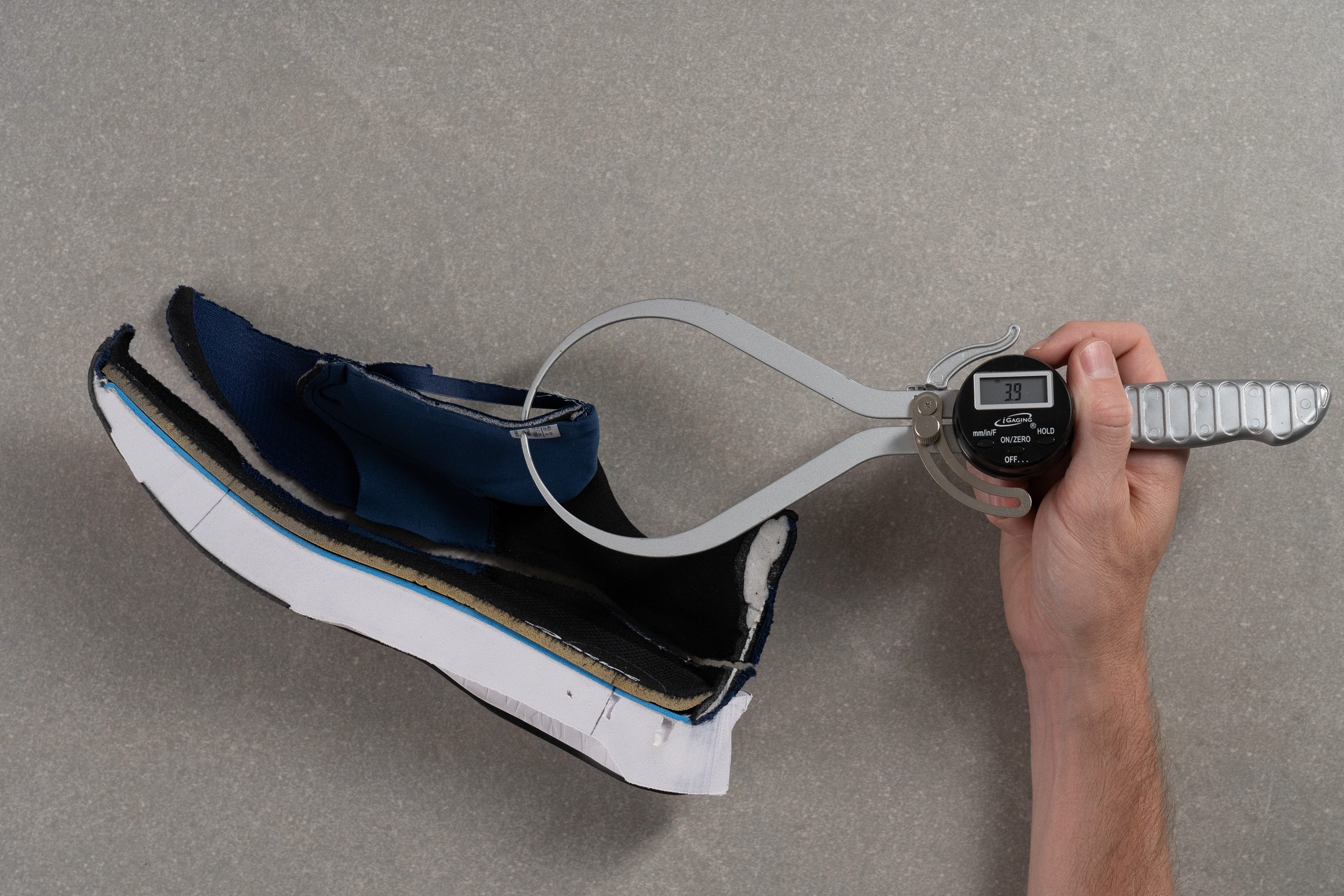
| Dynablast 5 | 3.9 mm |
| Average | 5.7 mm |
Tongue: gusset type
The tongue is semi-gusseted, an uncommon feature at this price point. It enhances lockdown and provides a more secure, confident ride.
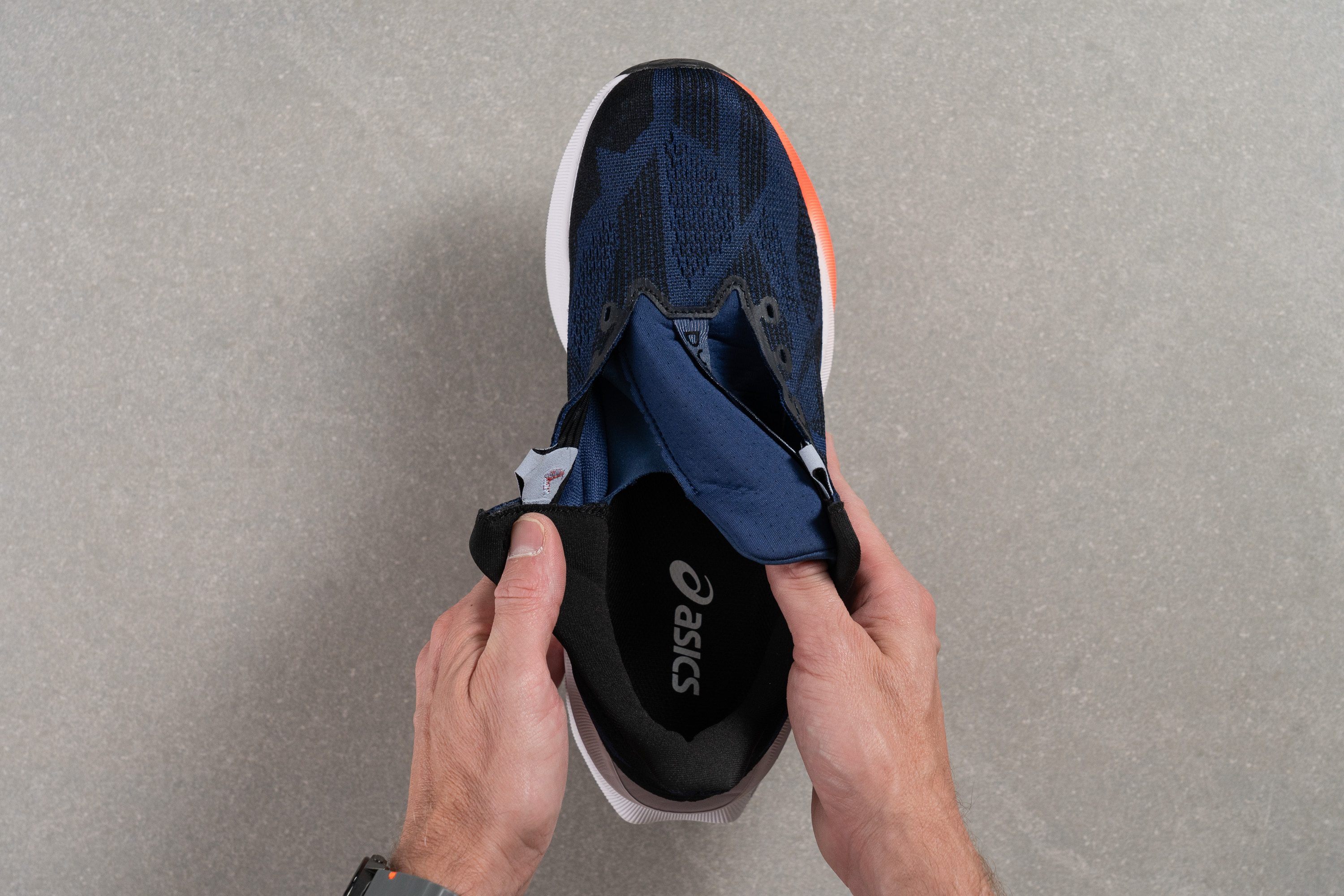
| Dynablast 5 | Both sides (semi) |
Price
ASICS cleverly recycled a 2022 model with minimal updates and new branding, cutting development costs to deliver a highly competitive daily trainer. So yes, value easily stands out as one of its strongest qualities.
In our view, this shoe is hard to beat if you want the best balance between shock absorption and price.
| Dynablast 5 | $120 |
Heel tab
While some Novablast 3 versions featured a finger-loop heel tab in the LE version, most colorways came with the extended heel collar design, which is exactly what the Dynablast 5 gets.
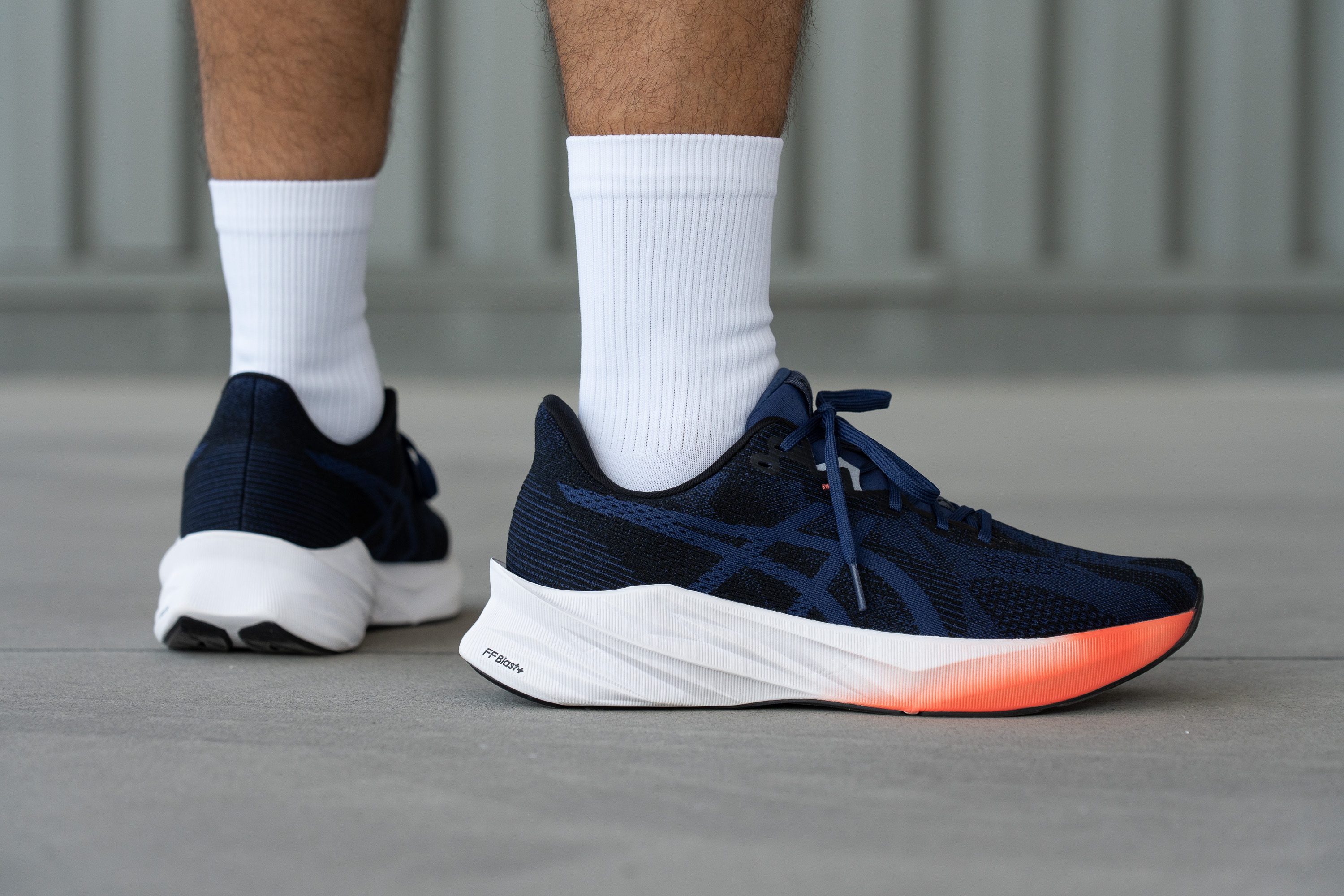
| Dynablast 5 | Extended heel collar |

